#smart home satire
Explore tagged Tumblr posts
Text
The Existential Horror of Seeing Yourself in a Ring Doorbell Notification Still
There was a time when I thought walking to my own front door was a perfectly ordinary act. Innocuous. Graceful, even, if the wind was behind me and I’d remembered to zip my coat up. But that was before I installed a Ring doorbell—before my entire sense of movement, posture, and dignity was shattered by a grainy still image captured at the precise moment I looked like I was either drunkenly…
#awkward doorbell photos#funny Ring stills#home security humour#Ring doorbell#Ring doorbell notification images#smart doorbell humour#smart home satire#surveillance anxiety#tech fails
0 notes
Text
Finally watched Starship Troopers and I have a lot to say about it.
First of all, the idea that anyone could see this movie as not being a satirical parody of American militarism and fascism is baffling to me, then again there’s people that think Warhammer 40,000 is pro-militarism and fascism, and I guess if you watch this when you’re dumb and 15 it might go over your head.
It’s extremely dubious as to whether the bugs are actually aggressing against the Federation in the first place, and very likely that it’s something exaggerated or made up wholesale by the government to justify their own aggressive expansion.
It has the plot and all the trappings of a big dumb oorah go-America action movie, but reframed as a terrible tragedy.
Just about all the main characters join the military for reasons that to not involve “wanting to join the military,” but the society they live in has set it up so that for most of them it’s the only way forward in life, and in the military they’re worth less than the uniforms they’re wearing.
They’re sent to a training camp that abuses them violently, and then sent to the front lines to die. Not to fight, to die.
Analyzing this movie from a military tactics perspective, the mobile infantry isn’t meant to survive, their only job is to deliver death to the enemy’s homes by shooting those micronukes into the hives. The rifles and body armor they’re all equipped with are near useless and only exist to make them feel brave enough to go towards the enemy and shoot the micronukes.
Their squads don’t have medics, machine gunners, or anti-armor equipment. (The nuke launchers don’t count as anti-armor they’re too dangerous to shoot at anything within like 200 yards.) In the first mission, if they had had any of that, they could have held off the bug counterattack enough to get way more soldiers off-planet. It still would’ve been a losing battle but it wouldn’t have been such a massacre. Hell, it might have even spared more bug lives, because the rifles still kill bugs, but do so extremely slowly, enough that it just results in both sides dying more. But survival of the federation infantry was never an objective, they are just a delivery system for the nukes, they might as well be suicide-bombers.
In the second mission, the government knew it was a trap but sent them anyway, without telling them.
Rico is not a good commander, but keeps getting bumped up the ranks anyway because of the mass death. He doesn’t think for himself and the only order I think he actually gives in the whole movie is “kill them all,” which, yeah, great plan. If they had fallen back at that moment, more of them would’ve survived.
Once he actually starts climbing the ranks, he literally doesn’t even say anything original, he just repeats what he’s been told, quoting the Lieutenant word-for-word.
The Lieutenant, despite being a crazy fascist like everyone else, is legitimately a good leader and commander. No one would’ve made it out of that ambush if he didn’t make the calls he did when he did, but Rico, who replaces him, doesn’t have any of those command skills. He’s got all the macho bravado but none of the smarts. He’s going to be the kind of commander to lead a valiant doomed charge into enemy machine gun nests.
And then at the end when it shows all the surviving main characters in their higher-ranking positions that they only got because people ahead of them died, and it shows the subordinates even younger than the main characters were when they joined. It was sickening.
And also all the top brass are just straight up dressed like Nazis.
It was a great movie though, especially if you're an Imperial Guard player like myself.
438 notes
·
View notes
Text
// genshin men as podcast hosts //
i don't have anything to say for myself i just thought this was really funny LMAO suddenly thought about this in the shower like a week ago nd i couldn't stop giggling to myself ( ´艸`) cw: crack, wrote this with a modern au in mind (unless there's podcasts in teyvat.......) includes: alhaitham, ayato, pantalone, tartaglia, kaeya, albedo, cyno, heizou, lyney, venti, dottore, itto, kaveh, kazuha, wriothesley


the satirical Chad Alpha Sigma Male ↳alhaitham, ayato, pantalone, tartaglia, kaeya
Whether they’re giving ridiculous financial advice, telling people how to get women to like them or spouting absurd political takes, they somehow have a loyal fanbase. They’re always playing up the Sigma Male persona for the sake of satire but, because this is the internet, people take them seriously.
They'll say something nonsensical like “you should treat women like you treat your nonstick frying pans” and their listeners will eat it up, praising them for such a smart analogy when, in reality, their podcast setup consists of their laptop and a mic set up at their kitchen table and they just laid eyes on a skillet while they were rambling about nothing in particular. Doesn’t matter how they speak either; they could have a typical, exaggerated youtuber accent or always speak in a deadpan tone- people will still take what they say at face value and miss the irony and satire.
Seeing people argue online entertains them, though. Plus they make good money
the one that always has homoerotic tension with their guests (no homo tho) ↳albedo, cyno, heizou, lyney, venti
Their podcast isn’t organized, they kind of just ramble about whatever topic comes to mind. There’s no theme, no plan when they start recording- they basically just have a conversation with whoever they’re recording with and see where it goes. Sometimes they could be cracking jokes about the corniest things (___er? i hardly know her!) or they’ll be having deep conversations about their childhood and why they turned out this way.
OR. They’ll chat with their guest and turn what they say into a dumb sex joke, even if it’s a stretch. Podcast episodes with them are always hilarious to listen to, the kind that you can’t listen to in public because you’ll end up holding in your laughter and making yourself look like a Fool.
They have the best vibes, too; listening to them and their guest makes you feel like you’re a part of the recording session, even if you can’t respond to them
has THE most outlandish storytimes ↳ dottore, itto, kaveh, kazuha, wriothesley
Every single podcast episode with them is absolutely unhinged. They’ll start the recording with their intro, and then they’ll hit you with the most insane storytime opener. There’s no line to cross either; it doesn’t matter what kind of story they have in store, they will talk about it (and make it funny, even if it might not be). One time when they uploaded one of their podcast episodes to YouTube it ended up getting age-restricted in the first five minutes.
They’re the kind of host that can captivate anyone when they’re telling a story, whether they’re speaking in an extremely animated manner or in a convincingly serious tone. Whenever they have special guests over, they make it an unspoken challenge to one-up eachother on who has the craziest story to tell (most of the time they’re the winner).
Their podcast is the kind of thing you listen to while you’re getting ready in the morning... though it might not be the best idea because 9 times out of 10, you stop in your tracks to stare at your laptop screen in disbelief to listen to them talk about the time they accidentally set off the fire alarm in a retirement home and what happened in consequence to that

#genshin x reader#alhaitham x reader#ayato x reader#pantalone x reader#tartaglia x reader#kaeya x reader#albedo x reader#cyno x reader#heizou x reader#lyney x reader#venti x reader#dottore x reader#itto x reader#kaveh x reader#kazuha x reader#wriothesley x reader#୧ ‧₊˚cat's work!
508 notes
·
View notes
Text
Historian and writer on democracy Timothy Snyder says that there should be no question as to who is dominant in the Musk-Trump relationship.
Allies and aides to Donald Trump should be increasingly concerned by Elon Musk’s proximity to and influence on the US president-elect, the Yale historian and bestselling author Timothy Snyder said. “Trump is a little guy, and Musk is a big guy when it actually comes to having money,” Snyder said. “And I think if you were a friend of Trump, you would be worried.” [ ... ] Snyder expects that Trump’s soon-to-be home, the White House, will be a stage for uncomfortable and damaging discord between the president-elect and his most powerful ally, the world’s richest man. “I think we overestimate Trump and we underestimate Musk,” Snyder said. “People can’t help but think that Trump has money, but he doesn’t. He’s never really had money. He’s never even really claimed to have money. His whole notion is that you have to believe that he has money. But he’s never been able to pay his own debts. He’s never been able to finance his own campaigns. “Musk, with an amount of money that was meaningless to him, was able to finance Trump’s campaign, essentially.” [ ... ] Since Trump’s victory in November, from Mar-a-Lago in Florida to Notre Dame in Paris, Musk has been constantly at Trump’s side, earning the satirical nickname “first buddy” but also an appointment with the biotech investor Vivek Ramaswamy to jointly head the “department of government efficiency”, or “Doge”, a group tasked with meeting Trump’s wildly ambitious campaign promise of slashing trillions from federal spending. Considering instances of Musk’s apparent influence over Trump as the president-elect has struggled to control congressional Republicans – an unruly party already split on how to continue funding the government they also want to defund – Snyder said: “All the threats that Trump is now going to issue – ‘I’m going to primary people, I’m going to sue people’ – Musk is going to pay for that, not Trump. And when Trump needs money for anything, he’s going to be asking Musk. “Unless Trump breaks it off right now, he’s going to be in this kind of dependent relationship for the rest of the way, because you get used to people giving you money … and I think if you were a friend of Trump, you would be worried.”
Prof. Snyder has invented a name for this peculiar relationship.
“So I thought about this dependency position,” Snyder said. “I was going to call it Muskotrumpovia, because I think Musk is a more important person, but Trumpomuskovia had a nicer ring to it. “And also, I wanted Muskovia because I wanted the idea of Russia to be there in the background, because a lot of smart Russia hands are saying this all the time: this is kind of like the 1990s in Russia. You have the doddering, rich-but-not-very-rich president [Boris Yeltsin], surrounded by more youthful, more active, ambitious oligarchs. That’s the kind of scenario [America is] in.”
Trump thinks he's Vladimir Putin but he's more like Boris Yeltsin – but stupid instead of drunk like ol' Boris.
#donald trump#elon musk#the first bro#republicans#timothy snyder#trumpomuskovia#muskotrumpovia#vladimir putin
115 notes
·
View notes
Text
GUTS, luke castellan x oc(prologue)

summary: where an aphordite daugther falls for this lying hermes boy.
disclaimer: english is not my firt language.
We don't get to choose who we fall in love with.
Arianne knew that. She believed it to her core. Love was something magical and illogical. Her own father, said it when he told her about her mom. Apparently, she was a beautiful young woman that crossed paths with Nicholas Deveraux (her father) during his travels in Europe before officially settle down in the family business in Chicago.
Everyone expected that Nicholas would come back from Europe with a bad tan and a few souvenirs, not a freaking newborn baby daugther.
Nicholas was a loving father, but not a really smart man. That is It's one of the reasons she didn't question when a man showed up at her Chicago home, offering her only daughter a scholarship to a prestigious boarding school.
Arianne came to camp half-blood when she was thirteen years old. After some encounters with several monsters, Chiron himself went to her doorstep in Chicago to get her to camp.
Nevertheless, during her arrival there was an incident. An incident involving three more demigod, a satire and a cyclops.
Arianne was claimed a few weeks after the attack, same as the two demigos that survived. Luke Castellan, son of Hermes, and Annabeth Chase, daugther of Atenea.
And let me tell you, Arianne Deveraux didn't choose to fall for the son of the Traveler. It was fate, or maybe was her mother ? She wasn't really sure. They started off as friends, adapting to camp at same time, being the same age, having the same friends.
Arianne was a nice, generous and beautiful girl, she was the perfect definition of an Aphordite daugther. Everyone that knew her personally (and even those who didn't) held her close to their hearts. Knowing that if you had to trust someone, you could trust Arianne Deveraux.
It was also a flaw, being the goodie older sister of Camp Half-blood.
At sixteen, she was named captain of Aphordite cabin. At the same time, Luke Castellan was named captain of Hermes cabin. They started to spend more time together, attending bonefire together, sparring together... Then the gifts started, Luke liked how her eyes would shine everytime she opened a present, no matter how stupid or simple. He would get her little details, It was his way of showing love, his love language, and her siblings would beg her to ask Luke to please, please, get them things for the cabin.
On the othet hand, Arianne would be (even without her knowing) the best of the presents for Luke. She was kind and beautiful, and gave him all the attetion he craved. And even Annabeth liked her, and would let her do her hair when she was tired. She was a part of their little, broken family.
Sometimes, Ari would cover up for Luke, when he sneak out to get things for other half-bloods and for himself. Like a PlayStation or some chess board for Annabeth, or his little presents for Ari.
Sometimes, Luke would sneak her in the Big House, to use the phone to talk to her father.
Every friday night, the would sit in the shore of the lake, to talk about everything or to be completly silent. Every time the scar on Luke's face hurt, Ari would stay by his side and try to ease the pain. Every time Ari felt like the stress of carring everyones problems and her owns, Luke was there to relieve her.
They were partners in crime, always there for each other.
That, until an enemy emerges from the shadows and resentment.
That, until one betrays the other.
Until Arianne Deveraux feels love and hate in her guts.
#luke castellan x oc#luke castellan x reader#luke castellan imagine#percy jackon and the olympians#percy jackson#pjo show#pjo series#pjo#luke castellan#arianne deveraux
526 notes
·
View notes
Text
one piece smau: married to marco edition
marco x male reader
-> marco is NOT that old at all, i jus feel like itd b so funny for him to b seen as old for his lack of knowledge on technology and slang terminology/phrases
-> also whitebeard having instagram is so fucking funny to me bye
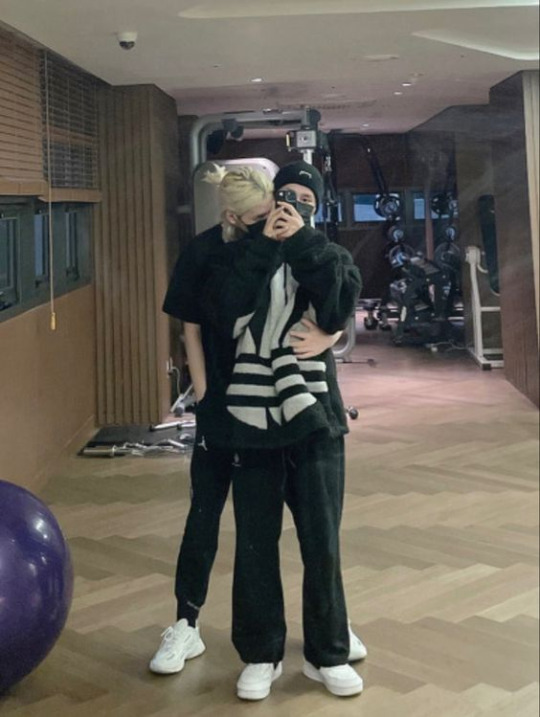
liked by marco4[name], portgasace, and 10k others
polo.[name]: mirror selfie 🪞
tagged: marco.phx
marco.phx: ur new username is such a terrible pun babe
-> polo.[name]: maybe youd appreciate my grand creativity if u jus matched w me ffs
-> marco.phx: dont b a smart ass we aren't matching usernames
-> polo.[name]: ur the only man that enjoys being a smart ass dont give me attitude rn
portgasace: ohhh u guys r the type to jus take mirror selfies at the gym and then dip 🙄🙄
-> marco.phx: work on ur form and then we can talk
-> WHIT3BEARD!: BOOM roasted
[liked by marco.phx, polo.[name] and 400 others]
-> portgasace: ?????
eee.izo: aww my favorite gay couple ❤️ i love whenever u two post

liked by polo.[name], eee.izo, and 15k others
marco4[name]: username change even though i already put a ring on his finger and that apparently wasnt enough??
tagged: polo.[name]
polo.[name]: seeeee isnt that just such a cute username <333
-> marco4[name]: ur cuter baby ;)
-> portgasace: BARF BARF BARF VOMIT VOMIT VOMIT
vivavista: awww marco does love [name] how adorable
-> marco4[name]: who said i didnt?
-> vivavista: ur username before u changed it....
-> marco4[name]: ur fw me....
chef.thatch: seeing marco being so publicly whipped for his hubby is heartwarming
[liked by polo.[name], portgasace, and 100 others]
-> polo.[name]: hehe hes all mine 🤭🤭🤭

liked by marco4[name], WHIT3BEARD!, polo.[name] and 17k others
eee.izo: absolutely sick to my stomach i hate these two
tagged: marco4[name] and polo.[name]
polo.[name]: holy shit this is such an old photooo
-> marco4[name]: ur talkin sbt it as if it wasnt jus three years ago...
-> polo.[name]: not seeing ur GRAYING hair is weird for me OLD MAN
-> portgasace: LMFOAOA damn gonna have to report marco for being a creepy old man for dating [name]
-> marco4[name]: u two r idiots, im only 5 years older than u [name]
-> polo.[name]: its ok i love u my beautiful old man husband
chef.thatch: aww isnt it so cutteee that they were brought tgt by boss
-> WHIT3BEARD!: if they have a kid i expect them to name it after me.
-> polo.[name]: all due respect i dont think i wuld b able to sleep well at night knowing my kids name is "edward"
[liked by portgasace, marco4[name], and 100 others]
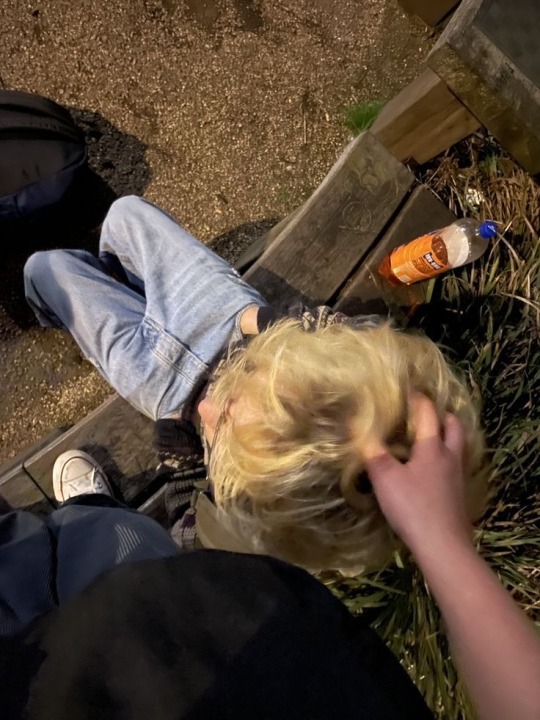
liked by marco4[name], vivavista, and 14k others
polo.[name]: step by step guide on how to bag a blonde baddie:
1. be me
tagged: marco4[name]
marco4[name]: whatever happened to callin me ur husband???
-> polo.[name]: ur my baddie husband marco b proud <3
-> marco4[name]: young ppl and their terminology.....
eee.izo: i wouldve never used the word baddie to describe marco...
-> polo.[name]: hes a hot mysterious stoic damaged baddie old man and hes alll miiiinnneee 😍
-> eee.izo: its so hard to tell when ur being satirical
portgasace: he a baddie he showin his pantyyyy ‼️‼️
-> polo.[name]: he shake it like jellyyy 😩
-> marco4[name]: im uncomfortable.

liked by polo.[name], portgasace, and 15k others
marco4[name]: me n my husband ❤️
tagged: polo.[name]
polo.[name]: im going feral for u daddy 😻😻😻😻
-> marco4[name]: ffs
-> portgasace: count on [name] to humiliate his husband in his own comment section
[liked by polo.[name], vivavista, and 200 others]
polo.[name]: why did u choose such a hot photo of u im gonna have to fight for my life in these comments now :/
-> marco4[name]: theyre all unimportant babe dw abt them
eee.izo: marcos tiddies on my tl 😩😩😩
vivavista: damnnn marco u lookin fine aslll 😘
chef.thatch: wait till u come home i got a surprise for u in the kitchen baby
-> polo.[name]: no fuckin way.
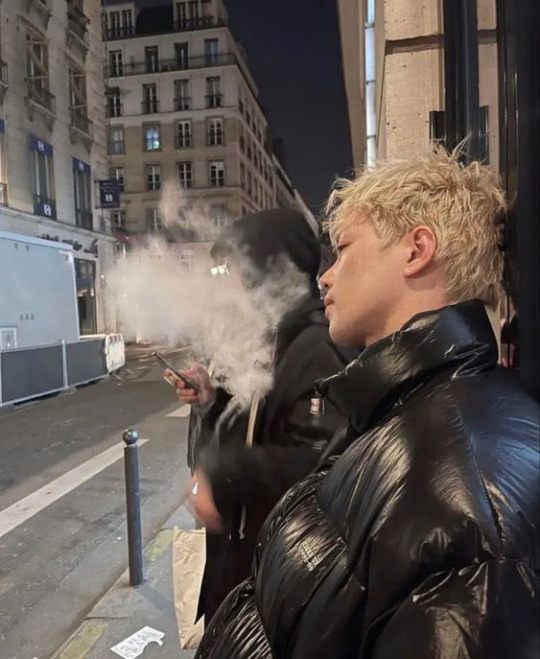
liked by marco4[name], eee.izo, portgasace, and 10k others
polo.[name]: smoking kills...BUT BEING SMOKING HOT??? THATS A DIFFERENT STORY
tagged: marco4[name]
marco4[name]: ur unbelievable????
-> polo.[name]: i love u sm u sexy FREAK
-> marco4[name]: PLEASE STOP.
portgasace: bro cooked fr in thst caption
-> polo.[name]: yk me 🤭🤭
-> chef.thatch: what exactly did [name] cook...
-> marco4[name]: thats what im trying to figure out
eee.izo: what a truly poetic caption wowwww
-> polo.[name]: i discourage smoking for everyone. instead of smoking guys, just find urself smoking hot ppl to fill the voic. perfect example is my husband marco <3
[liked by marco4[name], portgasace, and 100 others]

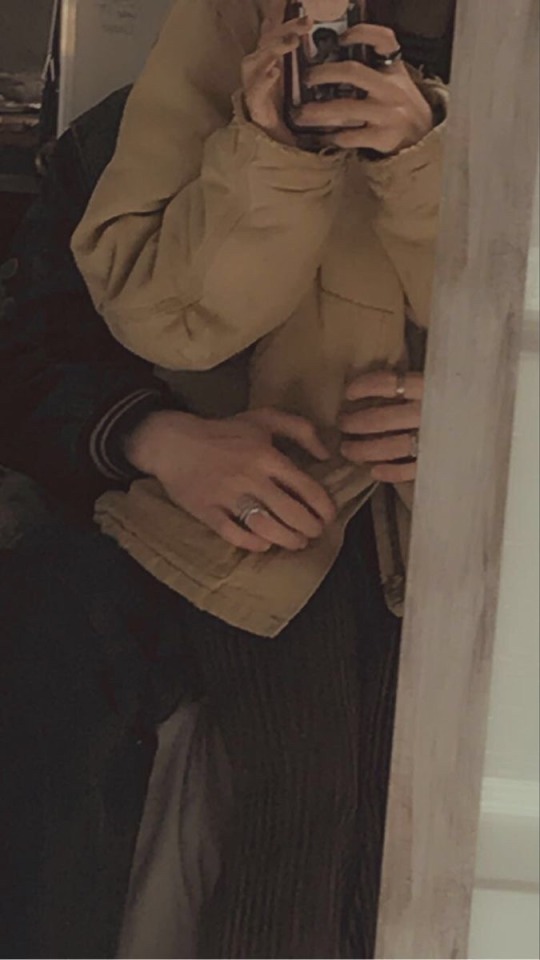
liked by polo.[name], WHIT3BEARD!, and 20k others
marco4[name]: married life is for me
tagged: polo.[name]
polo.[name]: AWWWWWWWWWWWW u love me
-> marco4[name]: of course i do
portgasace: VOMIITTTEDDD VOMITTTTEEDD (u guys r so cutie wootie patootie awww)
eee.izo: took him being a whore thru his twenties to realize this, how cute
-> eee.izo: im sorry making fun of marco is too funny, this was very cute
-> marco4[name]: thanks + sleep w one eye open tn
WHIT3BEARD!: like i said tht kid u adopt better b named after me.
-> marco4[name]: [name] just visibly cringed.
polo.[name]'s story
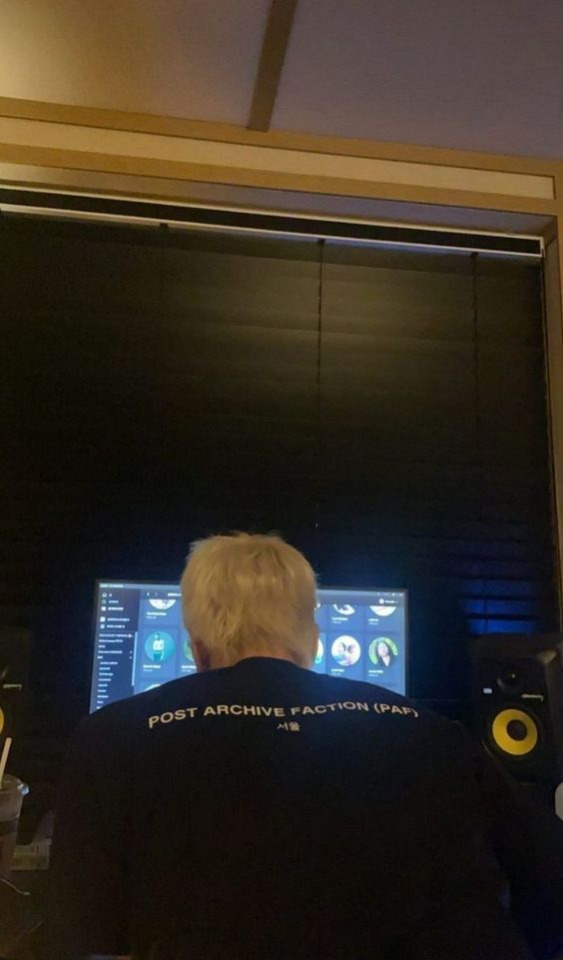
my favorite view should i try climbing him guys <333
marco4[name] replied to your story: ......i know this means u love me so im just gonna say i love u too
#≡;- ꒰ ° smau series ꒱#one piece smau#one piece modern au#one piece x male reader#x reader#x male reader#one piece imagines#marco x male reader#marco x reader#marco imagines#marco one piece imagines#marco smau
287 notes
·
View notes
Text
Heathers (1989)
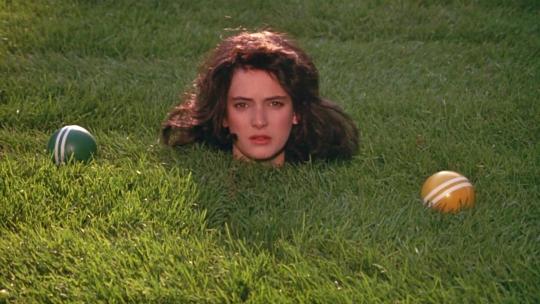
"If everyone jumped off a bridge, would you?"
"...Probably."
[TRIGGER WARNING: The movie is about murder, suicide, depression, anxiety and bullying, and it's a Rated-R movie from 1989, so SA is going to keep coming up. I'm going to be referencing all of that in this review. Also I'm a gay man and will be teasing people who have made this movie their personality, so tap out now if you and your cool vinyl collection can't deal with that.]
The movie starts as a fun black comedic take-down of saccharine 80s John Hughes teen romance movies. New-kid-in-school badboy edgelord JD, and repentant former wannabe cool girl Veronica, hook up and decide to live out the ultimate bullied nerd fantasy by getting revenge on Heather, Veronica's frenemy and leader of the Heathers, the most popular clique in school.
But when things go darker than Veronica planned, the comedic satire becomes a Shakespearean melodrama, as Veronica is suddenly confronted by the surreal consequences of what she's done, including realizing that the simplest solution to a problem may in fact make everything a hell of a lot worse.
I'm not going to spoil it for the 5 of you who haven't seen this yet. Everyone else (including me now) has seen it, as it is probably one of the most universally-popular Internet-culture movies there is. You've seen at least one meme from it.
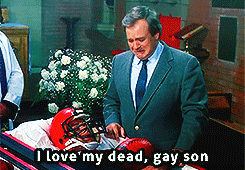
Probably this one.
While a flop in 1989, it quickly became a cult movie on home media, even by the late 90s being one of those movies your older brother and his friends introduced you to to let you know they didn't think you were a lame stupid baby anymore. And it seems now with streaming it is still kind of in that spot, the older brothers with tapes being replaced by Gen X / Millennials posting about how cool it is in front of teenaged lurkers.
So how did I miss it? I WAS the older brother growing up, and I was 7 when it came out. And when I did go back and get into all the 80s movies I missed out on by being a toddler when they were new, I stumbled into the Hughes stuff, notably Pretty in Pink, which is fundamentally the movie Heathers is mocking. As cynical and jaded as I am, I'm also a fruitcake, so I love me some sappy sunny crap (if it's to a greater artistic point, which the Hughes movies are). What I knew of Heathers had me thinking it was merely a demonstration of pretentious anti "popular media" whining from the sort of people who wear outdated hats and are insufferable about punk music.
...And it totally is. But also, it's more than that. It's actually really good and smart and occasionally insightful, when it restrains itself from all the emo "I can be your devil or your angle" posturing. Which, to be fair, it also makes fun of. Before that was even a thing.
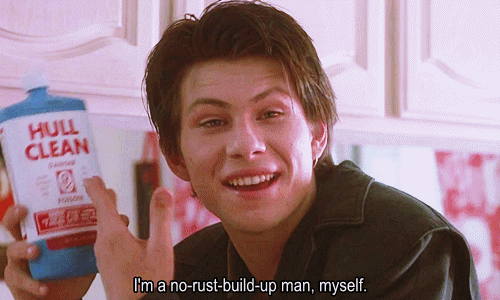
Christian Slater and Wynonna Rider have fantastic chemistry, and there's never enough of the two of them just enjoying each other's company. Even when they're arguing, it feels like a real couple going through something they'll almost certainly get over in a few hours (until they very much can't, and then they'll literally try to kill each other). Passion, is the word for it. Sardonic and low-key most of the time, but still passion. And that's always delightful.
It's well-shot and well-directed, with good uses of lighting and dynamic camera angles. There is a lot of scenes that are just two people talking, and it's never boring. Impressive for filmmakers who were, at the time, fresh-faced and working with a small budget. The style ends up being like if John Waters (no relation to Dan Waters, who wrote it) had directed Corman's Rock and Roll High School: goofy and surreal and sarcastic, but also willing to get dark and push boundaries to make a point.
All the characters - even joke side ones - are thoughtfully drawn, given emotional depth and realistic motivations, even when they're doing something stagey and broad in this highly stylized, Tim Burton-esque dark fairytale world. Wynonna Rider fought for the role against all advice, and it is perfectly in-line with the characters she played and the movies she played them in of this era, Beetlejuice and Edward Scissorhands. Maybe even Bram Stoker's Dracula, if we're talking surreal melodramatic action-horror with disco lighting.
It is a movie with lots of big ideas (probably too many), but it manages to get those across effectively. What starts as a simple teenager revenge fantasy morphs into an armchair analysis of what America does to its children - instead of nurturing them and preparing them for the adult world, it points at them and gawks, and cashes in on their fear and self-loathing and predictable self-destruction. Everyone in the cruel high school world of Heathers is both a perpetrator and a victim, desperately fighting for survival by both submitting to abuse, and then immediately turning around and heaping it on someone "beneath" them. Death here isn't genuinely mourned or reflected upon; everyone simply starts plotting how they're going to exploit this new gap in the line. And whether the victims kill themselves or are murdered only matters as far as someone can spin that into self-promotion. Even the priest at the funeral (the late great Glenn Shadix, Beetlejuice again!) uses the supposed suicide of a child as an opportunity to make a ham-fisted youth-oriented alter call.
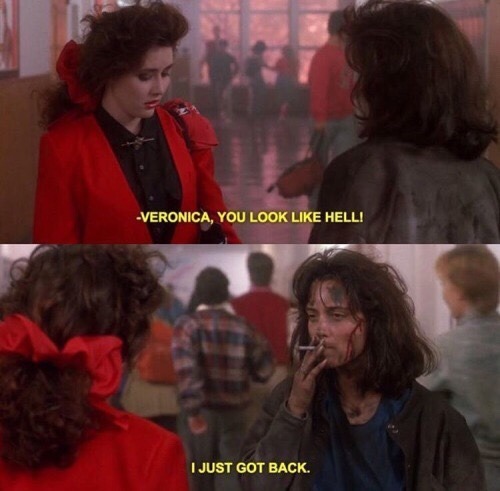
By the end of the movie, Veronica has triumphantly decided to rise up - not merely against the popular kids and exploitative / apathetic adults - but against the entire system of unending cruelty she didn't even know she was still playing a part in when she was actively attacking it. This finally sets her at odds with JD, who is too consumed by hatred to realize that the violence he thinks is a solution is fundamentally part of the problem.
And yet, as they come to blows, Veronica is also replaying the very same game that led her to become one of the Heathers in the first place, and then turn on them: use people to secure power, they use and hurt you, so you attack them. She knows the whole system is bad and broken and wants out, and seems to acknowledge the only way out is through earnest friendships and "growing out" of being shallow and petty. But by the end of the movie, despite her rebuke of JD...has she managed it? Maybe, maybe not. Maybe the system is inescapable, and all you can hope to do is find a way to force it to work for you. And choose then to make it less cruel. Maybe.
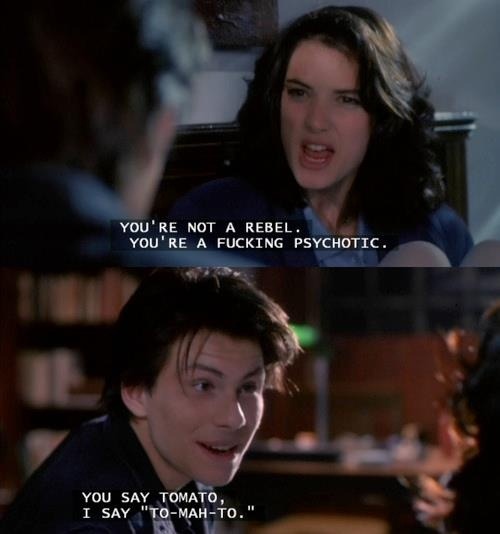
It's not a good or happy ending, it's just an ending. But a thought-provoking one, and the movie does it well.
...Mostly. The dialogue is trying very hard to be distinctively witty, but mostly comes across like a worse version of Clueless-ese, with more gratuitous vulgarities and no kitschy charm. A writer being very proud of how smart they are, without noticing that real people don't talk like this because it's awkward and obnoxious. Everyone's dialogue is basically interchangeable, including between the kids and adults (JD and his lunatic father have a fun distinctive thing they do, but that's about it). Now, lines being awkward and obnoxious doesn't mean they aren't eminently meme-able. In fact, that usually means they are. And they certainly are here. Nearly every scene has a memorable bon mot that can be endlessly parroted by people doing that so you won't notice their off-putting personality. ...I wouldn't call that a win for anyone, but it is certainly a thing.
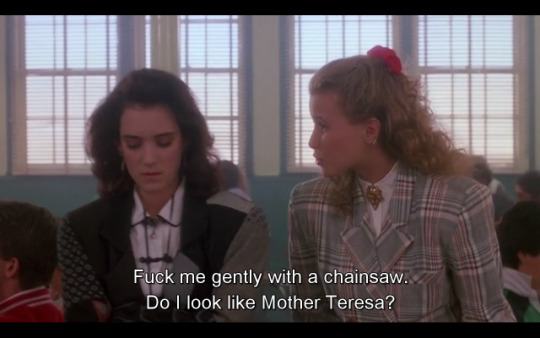
Remember: just because someone said it in a movie, doesn't mean it's inherently funny or profound or relevant to the conversation you've currently having. And you're not suddenly smart because you found a movie quote that you think expresses your exceptional hot take. In fact, that might be a sign that your are NOT in fact smart or insightful. Just putting that out there.
Also the "mineral water is for fags" thing is only funny because it's stupid. It was stupid then. That's the point of that being in the movie, to show how stupid these podunk morons in Ohio are. Stop repeating that 'joke.' It isn't funny out of context.
Gen X. Looking at you on this one. It's just you trying to give yourselves permission to still call people "fags." Doesn't work that way.
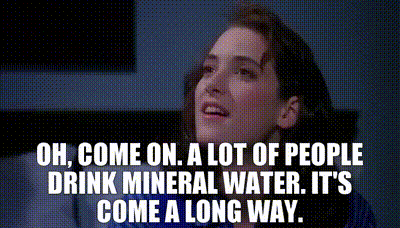
Christian Slater claims he was "channeling Jack Nicholson for this film." Yeah, okay, dude. And for the rest of your life, all the time. He's still a good actor and very charming here, but if that "Christian Slater" thing he does annoys you, it's at 11 here.
The pacing and tone get pretty muddled after the initial black revenge comedy stuff stops, as the movie uneasily transitions to its second major focus. It stops being funny entirely for awhile, until near the end when it suddenly remembers that was supposed to be a part of this, then sitcomy stuff elbows its way in. And JD's plans post-breakup with Veronica are left vague until they suddenly aren't, and I feel like I missed something. I didn't, and there's a point to them doing it this way, but it is handled kind of confusingly.
The movie is a scaled-down version of whatever epic Greek tragicomedy the writer originally dreamed up, and the studio demanded the pitch-black orginal ending be changed. And you can kind of feel that throughout. As an R-rated movie it is a lot tamer than it feels like it should be, and I for one wish the kills were gorier and more over-the-top. That more fits the tone. Maybe that was never the original intention, but you don't do Titus Andronicus without getting gross with it, you know?
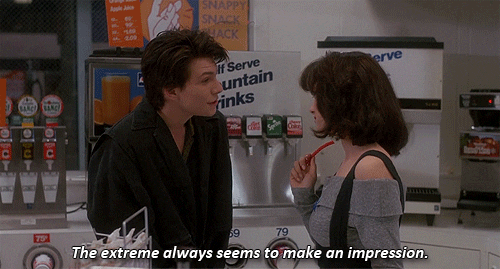
Any SA stuff is handled tactfully, and there isn't much of it, and it serves a narrative purpose. But that still feels like something that is only in here because it's 1989 and R-rated movies have to go there. And I don't feel like they really give those incidents the kind of emotional impact they should have on the victims. But again, this is a surreal world of unending cruelty, so maybe people shrug that off here. It's more my personal preference, if you're going to be gross to women in a movie (probably stop that, unless that's what the movie is about. Rape and molestation are not screenplay spices.)
The good far outweighs the bad, though. And Heathers is good, and is deservedly a timeless cult-classic for growing boys and girls, given what it deals with and how well it deals with it. It's entertaining and it makes you think, which is what good movies do. And it's endlessly meme-able, and that's okay, even if the people who meme it the most are silently warning you that they're pretentious and annoying about music. And that's only sort-of the movie's fault.
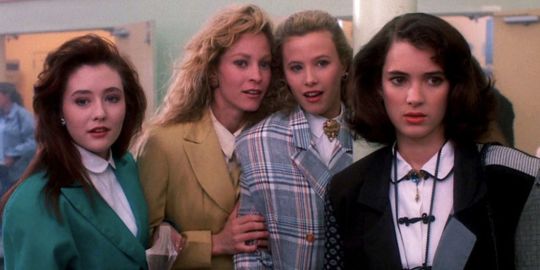
Also all the women in this movie have 9 lbs of dry fly-away hair that is just...painful. I realize this "unkempt Barbie hair" style was the best we could do at the time, but... I feel like I can hear it crunching every time they move.
Oh, and shoulder pads for days, shoulder pads FOREVER. I will never understand why the hell the 80s thought women weren't boxy enough. It was a thing.
50 notes
·
View notes
Text
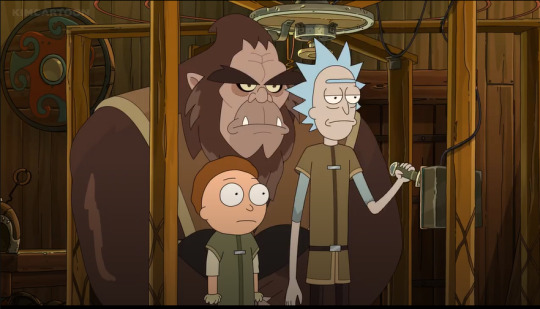
"Mort: Ragnarick" was pure fun, but a different kind of fun than "Rickfending Your Mort" and "Rise of the Numbericons: The Movie."
"Rickfending Your Mort" was a laid-back clip show that gave the viewer a break after the insanity of "Unmortricken"--a smart decision but not one with a lot of substance. "Rise of the Numbericons: The Movie" has been controversial. I thought it was entertaining, but it would've worked better as a YouTube short.
If "Unmortricken" represented lore episodes at their best, "Mort: Ragnarick" was the best of classic Rick and Morty adventures: a wildly imaginative plot, goofy satire, fantasy science and Rick and Morty working together as a duo, reminding us how much they need each other.
Rick's the driving force behind these adventures, but without Morty, he's just a miserable old man trying to distract himself. Morty's the heart and voice of reason. He also gives Rick something to live for. Without him, Beth, Jerry or Summer, why do anything?
Rick pretends to live for science, but "science" just caused decades of grief and isolation. His family isn't a concept; it's an entity that loves him back.
Bigfoot, an evil pope, Pokeballs, Valhalla, clone bodies, infinite energy sources, zombie Summer, Rick screaming "PO-O-O-O-OPE!": only Rick and Morty could combine all those concepts into one cohesive episode. I never thought "Wow, that took me out of the story." The Pokeball came close, but the end credits scene tied it all together.
Jerry's scene was a standout, too. Chris Parnell's reading of "Nana!" was genuinely sweet. It seems like Jerry's becoming a (mostly) willing participant in Rick's schemes instead of a helpless guinea pig. Is Rick learning that releasing his iron grip on his family makes them more attached to him, not less?
I also loved it when the Vikings called Rick a witch. He loves crystals, plays with magic, has two crows as familiars: damn right, he is!
You have to suspend your disbelief a couple of times, mainly when Bigfoot attacks Rick in the kitchen (he crushed Rick earlier like it was nothing, but now Rick walks away with a few scratches?) Still, the little character moments overshadow these flaws.
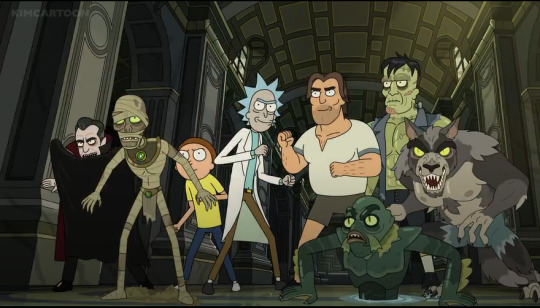
Judging by old posts that I've seen floating around, I think Rick and Morty's relationship is finally becoming what fans wanted it to be in seasons 1-3. Rick's still mean, but he's less dominant and more of Morty's mischievous co-conspirator. An alien mobster freaking out in "The Jerrick Trap" because of Rick's "touch my grandson and die" policy is straight out of fanon.
Rick's more physically gentle, and Morty responds in kind. He grabs and supports him when Bigfoot attacks him at home and touches his arm during their weird, overdramatic Bigfoot send-off. His pained cry of "Rick!" when Bigfoot nearly crushes him is heart-wrenching. Operation Phoenix is back online, but Morty's tired of watching him die!
Season five is when Rick started showing emotions on his face besides that cold, pissed-off glare--we all know the one--and in season seven, it's accelerated to Rick crying in front of others. He matches Morty's feelings instead of pretending that he's above human emotions.
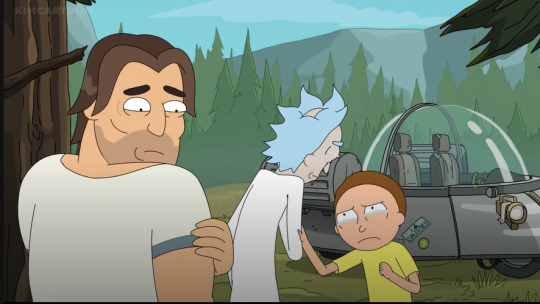
Needless to say, dudebros have been flooding Adult Swim's Instagram comments and Twitter replies with "Rick and Morty is shit now!" "Rick's too nice!" "Rick and Morty has gone woke!" Justin Roiland's firing gave them more fuel, but they started even while he was still on the payroll.
Their favorite line is "Rick isn't Rick anymore!" And they're right. Rick's not the asshole from seasons 1-2 who had a couple of redeeming qualities. He's not the monster that he was in season three and parts of season four. He's not the defeated man in season five who started to realize that he's hurting people but still wanted Morty to look after him like a child.
Season six is when he started to grow up--not a lot, but enough that he began taking on adult responsibilities instead of thinking he's a teenage boy who sees another teenager as his peer. I wish we saw more therapy appointments, but while they're mostly off-screen, we're definitely seeing the effects.
This doesn't make Rick a great person or atone for what he's done. Some of his crimes are beyond atonement, and not just the obvious ones like blowing up planets. This is a universe where everyone has a body count and events that should've destroyed Earth have no effect on civilization. Death and destruction don't mean that much.
His worst crimes are the personal ones: destroying Morty's psyche in "The Vat of Acid Episode," treating his family like garbage for most of season three. You can't atone for that. You can't apologize for that.
However, I don't only judge characters by their past. I judge them by their capacity to change.
Walter White is a brilliant character, but he's not a personal favorite because his arc is a slow descent into hell. Rick's slowly climbing out of his crater, and while it doesn't erase the past, it's still happening. For me, that's more satisfying than watching a monster become a bigger monster.
Of course, he's still not above cosplaying as Odin while wearing a golden crown that literally says "GOD." But the former "no girls allowed" alpha male has become a dedicated therapy patient who's also a thirst object that would make bros cry about double standards. Sure, Rick, you're a god, now put on that weird half-shirt and prance around a little.
144 notes
·
View notes
Text
⚔️ The Mind Behind the Flame
Keep calling me names. I’ll keep making your role models wet. 📸🦁
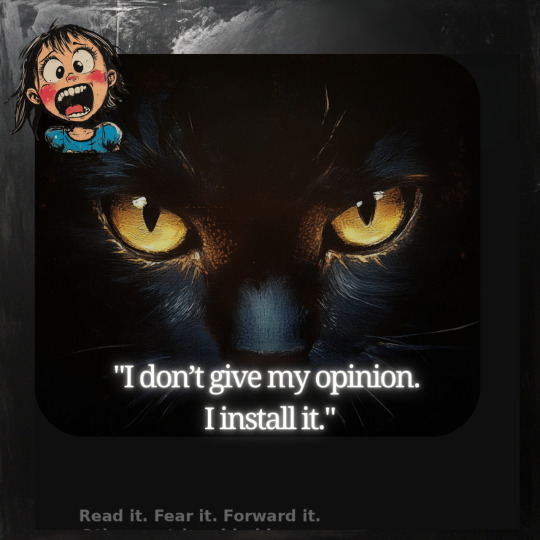
Welcome to the mental perimeter breach zone of the-most-humble-blog.
If you’re here, you’ve either:
Survived one of my posts,
Reblogged it in rage hoping someone else would call me a monster,
Or you’re one of those rare few with enough cognitive muscle to recognize a pattern of truth when it slaps your ideology across the face.
Either way: You're here. You're reading. And that means the trap worked. 🧠🐺
🧠 Who Runs This Blog?
Call me Mr. Humble. Not because I’m meek — but because I let my words slaughter politely.
I’m a former military leader, multi-degree academic, global observer, and cultural analyst with no allegiance to fragile narratives.
I’ve led men. I’ve mentored women. I’ve been across borders, across belief systems, and across the battlefield of modern manhood.
I’ve seen the psychological fallout of cultural regression. I’ve seen how truth, logic, and masculinity are now treated like viruses. I’ve seen brilliant men go silent out of fear. I’ve seen mediocre minds weaponize pity for power.
And I said: No more.
This blog is what happens when a highly aware mind gets tired of pretending it's confused.
💥 What This Blog Is
A digital guillotine for mainstream delusion.
A satirical steel boot stomping down on ideological cowardice.
A home for those who outgrew emotional clickbait and can handle words that hit like a brick of truth to the face.
❌ What This Blog Is NOT
A hug box
A gender circle-jerk
A virtue-signaling farm
A safe space for bad ideas
An apology tour
Or a place to earn internet forgiveness for having a spine
If you’re looking for an “ally,” go outside and ally yourself with a blade of grass. This blog is for mental adults only.
🧠 My IQ Isn’t the Point — It’s What I Do With It
Plenty of people are “smart.” Few know how to use that intelligence like a scalpel and a molotov at the same time.
I don’t flex academic degrees. I flex consequence-based thinking.
I don’t cite studies unless they cut cleanly through your fantasy. I don’t “debate.” I perform intellectual amputations and meme the remains.
👁️ Why I Write Like This
Because truth doesn’t beg. It burns. It ruins dinner parties. It kills weak conversations. It shakes entire identity scaffolds.
Because feminism stopped being about equality years ago. Because men are bleeding in silence while the world tells them to “man up” and “shut up.”
Because emotional blackmail dressed as activism needs to be mocked into extinction. Because if I don’t say it, 10,000 men will keep swallowing their rage while pretending they’re fine.
This blog is their voice — said with the volume, venom, and verbal finesse they were taught to suppress.
🛑 Rules of Engagement
You are welcome here if you:
Think critically
Laugh at chaos
Can handle full sentences
Don’t confuse discomfort with harm
You are NOT welcome if you:
Use “-phobic” every time you feel wrong
Think tone is violence
Confuse identity with immunity
Start sentences with “as a…” and expect reverence
Believe truth is whatever makes you cry the least
⚖️ LEGAL: I’m Protected. You’re Just Loud.
All content is protected under U.S. free speech law, academic commentary, and satirical cultural criticism doctrine. You don’t have to like it — but you can’t do a damn thing about it. Want me banned? Try harder. Want me silenced? Bring facts, not feelings. Until then? You are just another screenshot waiting to happen.
🧠 If You’re Still Reading… Congrats.
You have enough awareness to realize:
Not everything that offends you is dangerous.Not everything that comforts you is true.
That makes you rare. And if you’re smart enough to get this far, dangerous.
Welcome to the tribe. 🦁
💣 TL;DR (For the ADHD-crippled)
Smart. Brutal. Free. Don’t like it? There’s the block button. The algorithm still remembers me.
🔗 You just read the mind. Now pick your side.
Share it. Bookmark it. Or block it.
🧠 Truth doesn’t beg. It burns.
#twitter#funny tweets#tweets#usa politics#feminism#lesbian#us politics#important#lgbtq#dank memes#humor#meme#writing community#writing prompt#writers on tumblr#funny#trends#jokes#news#life#life lessons
12 notes
·
View notes
Text
Particles of reality: Obsession
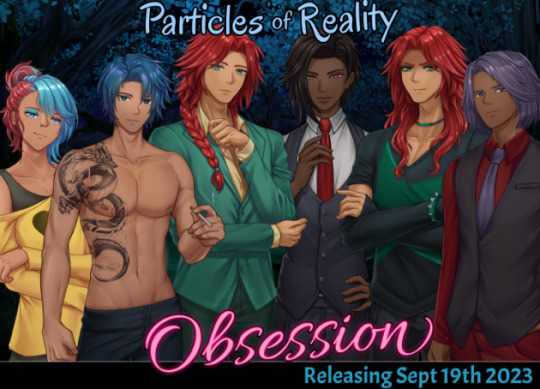
genre: dark, yandere, otome, crime, supernatural, NSFW
Not all stories have happy endings…especially this one.
I have a feeling this visual novel has done some permanent damage to my mental health, but I'm not regretting reading it.
!Please note: This game is for mature audience only!
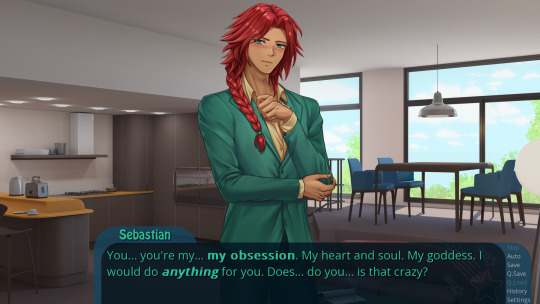
Particles of reality: obsession is dealing with very dark themes including gore, extreme violence, torture, sexual and mental abuse. It has graphic depiction of consensual and un-consensual sex (including sex between minors and sex between siblings). List of triggers for each path is enormous and it was pretty hard to read through some paths. There are options to hide some content, but even with "lower violence" filter it was gruesome enough. Like Monika, I hate the violence, but I was too interested in characters to skip everything.
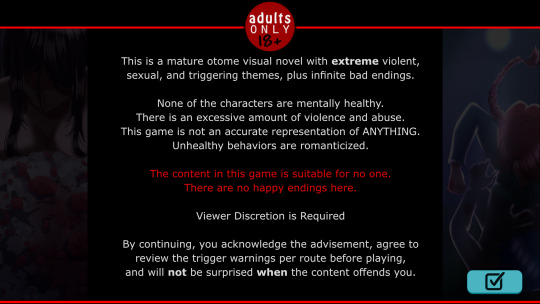
Monica is studying medicine in college and working at the cafe Luna to pay her bills. She has two close friends and a bunch of phobias, since she is a traumatized young woman with a troubled past. Monika hoped to separate from her family by enrolling to a college. But now she's stuck on a dead-end job, feeling claustrophobic in a small crappy apartment, also failing her studies and doubting her choice to be a doctor.
This is the time when in her life appears a tall handsome man, who has a strange interest in her. But the story unraveled…
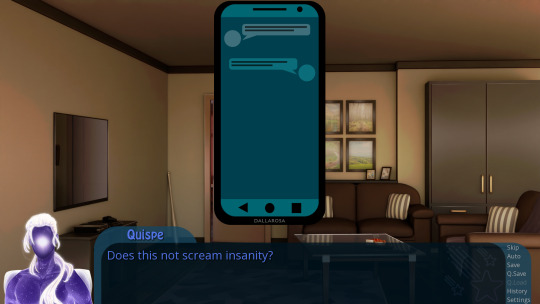
Particles of Reality is a macabre satire on dark romance, where relationship with violent people are romanticized, - and otome games, in which every character falls in love with a MC no matter how plain, or dull she is.
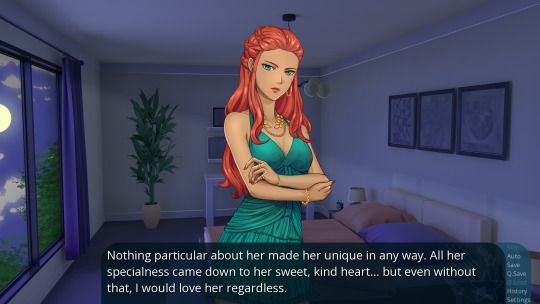
It is a splendid idea to show in visual novel that relationship with obsessive people can only cause you pain, but still overall it was a depressing experience for me. I can not recommend this game, but it has a highest rating from me, because it is unique and memorable. All the characters are either traumatized or just pleasurably insane.
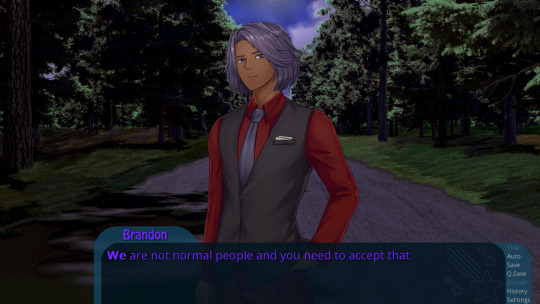
You are warned from the beginning that there are no happy endings in this novel. In those few where main characters at least don't die, Monica is still can not be happy because she's feeling trapped.
It makes sense, because it shows that with the characters like these, who are obsessed (and sometimes possessed), there can be no happy ending. They're traumatized, violent and mentally unstable. It is said that in Obsession the characters are the worst possible versions of themselves.
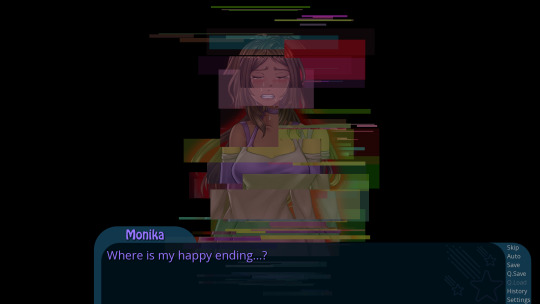
After a while it is getting too frustrating that no matter what you do the game finds its way to punish you. The characters are making very stupid mistakes and decisions - and you can do nothing about it but watch. Also sometimes the game is forcing you to read a lot of information that you already learn from other routes. I can see why it was hard to avoid, but still it was too much unnecessary reading.
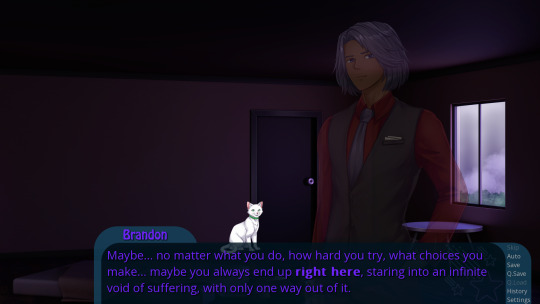
The structure of visual novel is unique - it has additional unlockable content for each character that helps to look further in their past or shows their point of view on the story. At some points the story is breaking the forth wall.
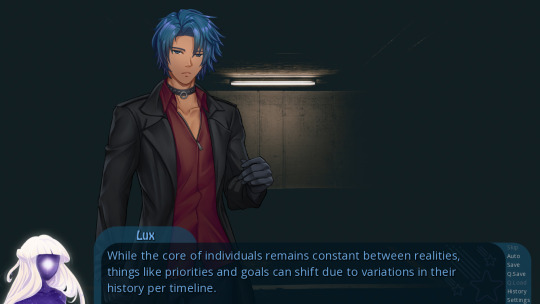
Nice touch that choices that doesn't affect the ending, are clearly marked.
Still after reading everything including the secret character routes, the story still has more questions then answers - and feels incomplete. The secret route was more confusing then revealing.
CHARACTERS
MC Monika Viotto (name changeable, but I don't see why someone would like to relate to this MC more, so I left it as it is)
My diagnosis: Post-traumatic stress disorder + Dependent personality disorder
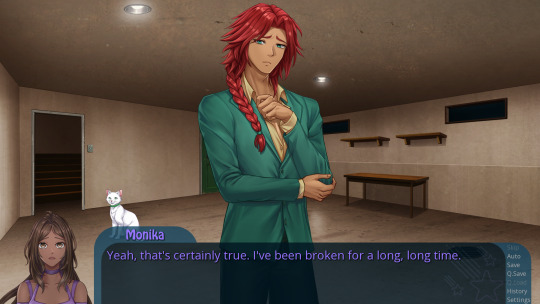
For me, Monika is a bit annoying. She's is your our typical otome MC - she is kind, shy, not very smart with average looks (though I think that she looks pretty cute). Because she was abused and neglected at home since childhood, Monika developed some phobias like nyctophobia and claustrophobia.
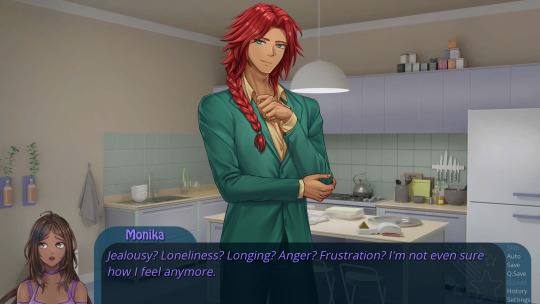
She says that she hates violence, but in each route she's attracted to violent people - probably that is the route of all the problems. In some paths she even shows a violent streak that she probably has (probably that is why she resents violence - because she knows she can have it in her too). Her family is mafia and though she wants to get away from them so bad, the violence in her household probably couldn't left her intact. However usually Monika is absolutely oblivious to everything happening around her. Sometimes she can stand for herself, but these moments of clarity happen usually too late.
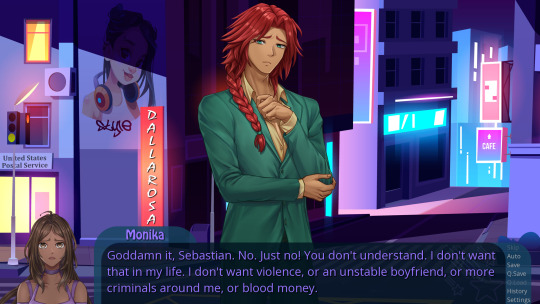
Who she is now is a result of her traumatized past, but also we can see that she's really passive and co-dependent since young age. She can't decide for herself (and when she is, she's deciding badly), she's not trying to learn something new, she doesn't understand her feelings and is not good with people. She's not good with anything really. Though she doesn't lack empathy and sincerely grieving loss of those who are close to her.
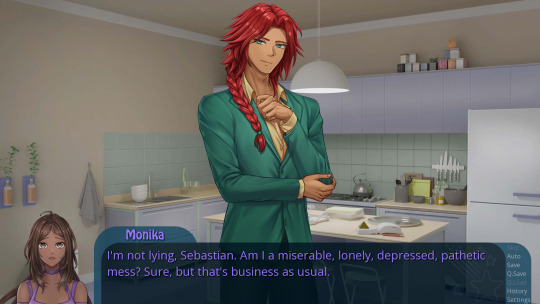
Sometimes she can be funny and snappy, but not often. She is more self-assured and interesting in some "what if" scenarios and in some branches in Brandon's route.
Love interests (SPOILER ALERT)
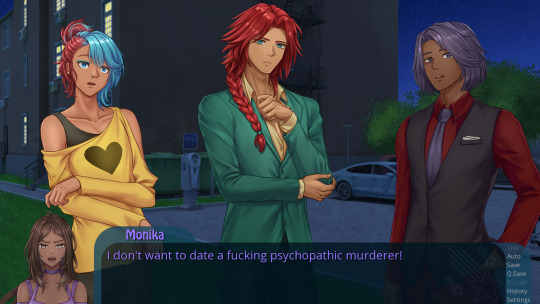
Which one do you have in mind?
None of the characters are mentally healthy. Some are aware of this fact, the others aren't. There is almost no romance, except maybe for the Sebastian route (which is my least favorite). There are some sex scenes though.
Each route starts differently and has slight time difference, but except for the Brandon's route, the circumstances in these are very similar.
Sebastian Dallarosa
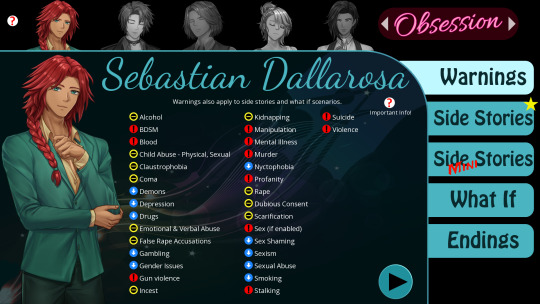
My diagnosis: Narcissistic personality disorder (?) Also typical yandere
Sebastian is tall, rich and handsome. Probably smart too. He's meeting MC on the street, saving her life from a car accident, and then taking care for her when she is getting sick. But something is not right about him. Or is it?
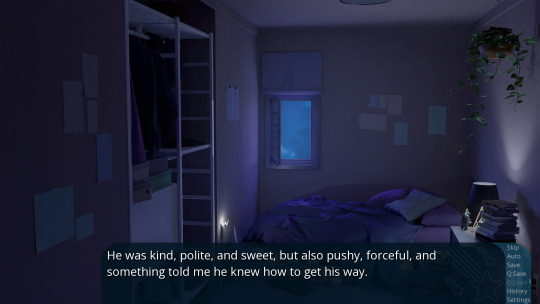
He's in love with MC since they were children. It was love at first sight, and now he believes that Monika is his soulmate - and he wants her no matter what.
Dallarosa is a mafia family too, like Viotto, but several years ago Sebastian and his twin brother refused to take over the family business - and it seems that Sebastian put all his effort to get Monika Viotto, because it is the only thing that he wanted - ever.
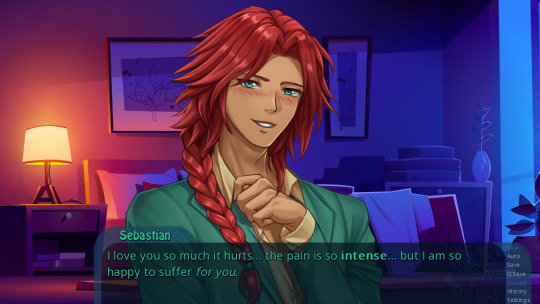
Sebastian is probably the favorite character of the developer, because his route is longest, plus he's appearing in every other route and in most branches. He has the most CG's. And I really hate him. Either because he's triggering something from my past, or because he is so sure of himself. He is the only one with almost no regrets or remorse. He thinks that his "love" justifies everything he's doing. I hate how he doesn't give Monika a chance to decide for herself, how much he's suffocating her, how he manipulates her. He doesn't care at all what she thinks, for he has her image in his head for a long time, and he doesn't care what Monika is like for real. He shows in all the routes, and in each one he's madly in love with Monika.
When you start the game, Sebastian's route is the first you have to finish at least once, and for some time his route is pretty romantic. He says nice things to MC, dotting around her, telling her what she would like to hear. But when things unravel, he shows his true violent and/or manipulative self.
The best part of Sebastian's route was Alexander. He seems much more sane (Maybe that is because he doesn't has his own route yet)
Julian Andrei
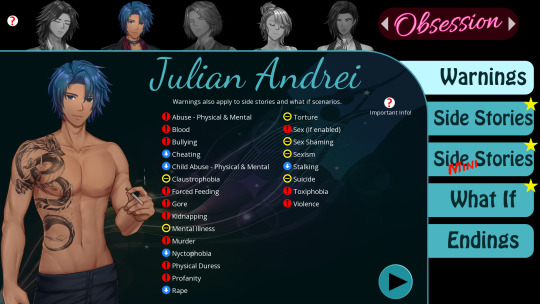
My diagnosis: Dissociative identity disorder
Julian is working with Monika in a Cafe Luna. He seems rude at first, but otherwise he is funny and always ready to help a damsel in distress. Except he has a strange habit of vanishing for several days once a month. What does he hides?
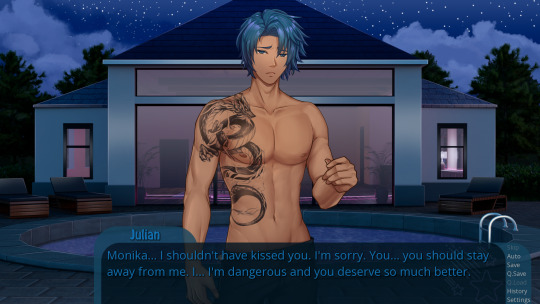
In Julian's route Monika has a crush on him when they first meet, and in other routes it is other way around. Julian in his route is the most different from himself in other routes, except Brandon's DLC. Because in most routes he is just a friend and co-worker of Monika, and doesn't show his violent streak, also he's pretty weak and can't stand himself against other characters. However we know from his route that he should be experienced in killing people, so it is strange that he's always trying to rescue MC unprepared. (I guess it is one of frustrating features which lead MC to unavoidable bad ends).
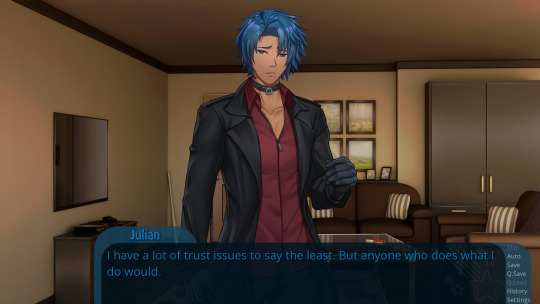
Julian is in constant conflict with himself - because he has a split personality, which seems to have a mind of its own.
As for the core personality, and not the worst version of himself, I like Julian very much. He is funny, honest and noble in his own way - and trying to do his best. I don't mind his complaining and self-consciousness.
Quinn Deidre
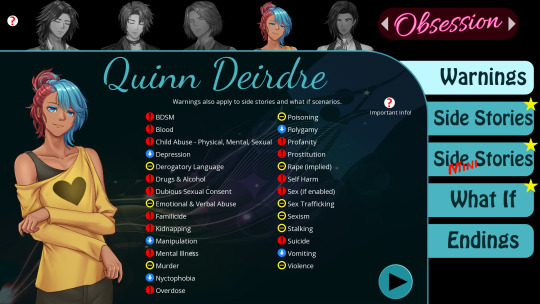
My diagnosis: Borderline personality disorder
Quinn is gender-fluid non-binary person. And also they are the most normal character. They are a ball of sunshine. Funny, active, kind, caring, creative. But they're trying too hard to get attention that they are forgetting what is good for themselves. Quinn definitely have BPD, and it is pretty accurate portrait of this disorder. Given their traumatic past, it is not strange that Quinn has it. Their family is fundamentally religious and they always felt that they don't belong at home. So they're looking hard for the place where they belong.
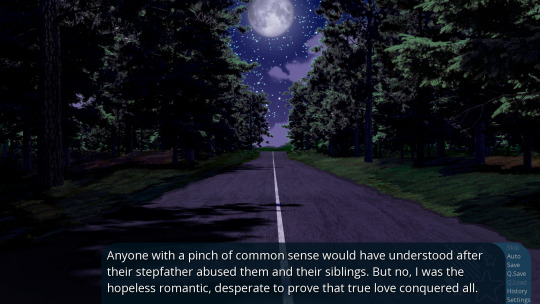
Meeting Monika as a roommate, Quinn is falling in love with her non-judgemental attitude. But of course, they can't stand to her other suitors. (Brandon strangely accepts Quinn)
Quinn is really sweet. His bad ends are pretty sad, because they mostly end with him hurting himself.
Brandon Viotto (free DLC)
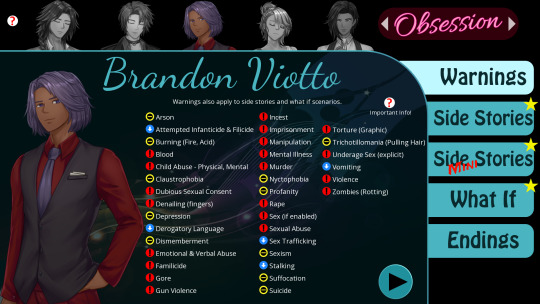
My diagnosis: Antisocial personality disorder (Psychopath)
Due to the themes of incest and underage sex (also extreme violence, but Steam is OK with it), Brandon's route is not accessible in the base game and can be downloaded as a free DLC (optionaly, because for some people this route can be too fucked up.)
Brandon's route is a history route: it begins when Monika was five, and all events in all branches are happening earlier than the beginning of Sebastian's, Julian's or Quinn's routes. You don't need to read through this route to finish the game and open secret character, but it is giving better view of Monika's personality in other routes, also after reading it, I hated Sebastian a tiny bit less.
Brandon is Monika's older brother. He's just a year older than she, but since the early childhood they were raised differently. Brandon was the favorite child, Mama's golden boy, he was given best teachers and was combat training to become the head of the family (Don). And Monika was neglected, harshly punished for all tiny mistakes, given little to no education. Most of the time their parents didn't pay any attention to her at all. Luciana Viotto is a powerful, cunning and cruel woman, and Antonio Viotto seems totally indifferent to everything that is happening in his family, until it becomes too late.
Things doesn't add up here - while Monika as a mafia princess was prepared to arranged marriage if nothing else, she probably had at least attend different social events to meet important people, but she didn't. Otherwise she would be just a disgrace of a mafia family (which she obviously become, when she went to a college, living in a worst district of a town and working for a minimal wedge)
Since tender age Brandon was trained to be a merciless killer. And while his first kills brought him tears and nightmares, later he started to enjoy killing and torturing people. Now he is hungry for power and control. And the only one he cares about is his sister. Monika.
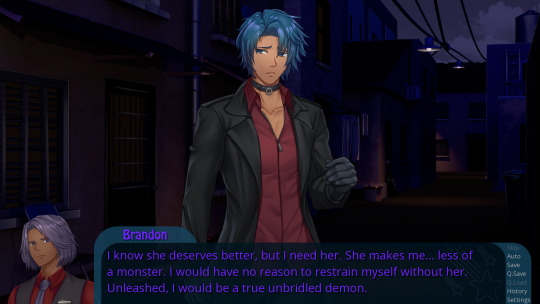
Since they were children, Brandon always tried to defend Monika from their abusive mother. They grew very close, because they always had to depend onto each other and didn't have anyone else. Monika needed Brandon because he always came to her rescue and Brandon need his sister, because she appeals to what left of human in him. She is still his moral compass after years of killings.
When he was about 15 year of age, Brandon felt that he his feeling for Monika is not completely brotherly.
After some time of his doubts and regrets, they've became lovers, when Monika was still 14 y.o. They both knew that incest is wrong, depending on the branch, they're having more or less doubts about it.
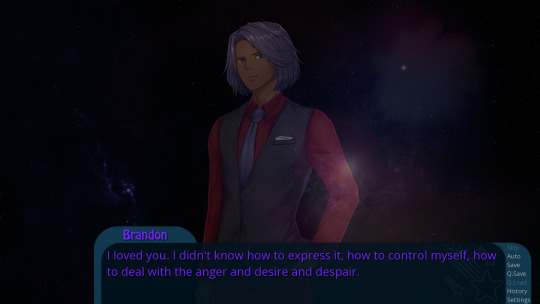
In most scenarios revealed that when Monika was 16, she attended school, where she has met a boy and started dating him. But Brandon was furious and beat the guy so bad that he couldn't recover. Monica hasn't talked to Brandon since then, until she decided to go to college where she begins all other routes.
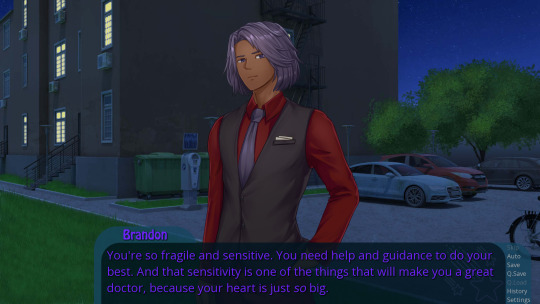
Brandon is the one who sees the best in Monika
I do not justify the incest, I've never understood it either. But given all the circumstances in this novel I think in Particles of Reality, Brandon is still the best choice for Monika. Maybe I'm prejudiced, because despite of everything , I liked him too much since demo. He's the only one who will never hurt her willingly, she can trust him completely and he's the one who accepts and understands her as she is.
The thing I like about Brandon the most is that he is the only one whose personality doesn't change a bit in all the routes and branches. I'm afraid that is because he's the least favorite boy for the developer, but still he doesn't pretend. Also he's the only one who is changing through his route - for worse, but still.
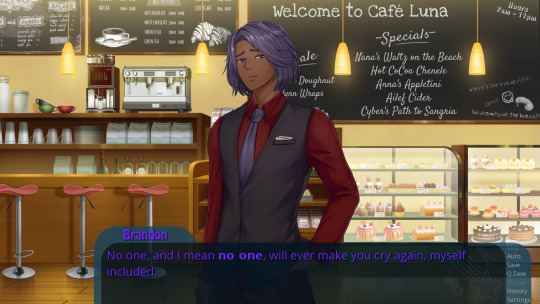
He is extremely violent, and doesn't hide that he is enjoying killing people, but it seems that he can have his doubts and regrets about everything that concerning Monika. (Nevertheless he still thought and done disgusting things)
He is also very smart, with a dark sense of humor, but I always felt that Monika can depend on him. With him she is safe, but he can go too far to secure her.
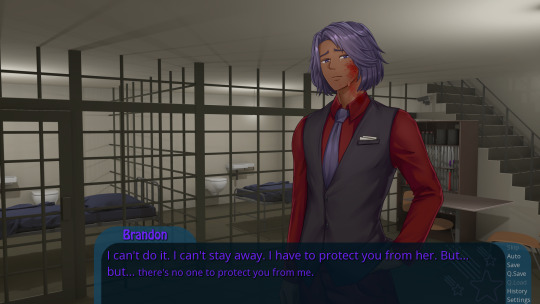
I can't rate any of the characters, since they're shown as the worst versions of themselves. As for their "core personality", I like Sebastian the least, because I can't find any of his personality outside of his obsession. As for secret character, his purpose in this novel seems only for breaking forth wall, so it is hard to say something about him for now.
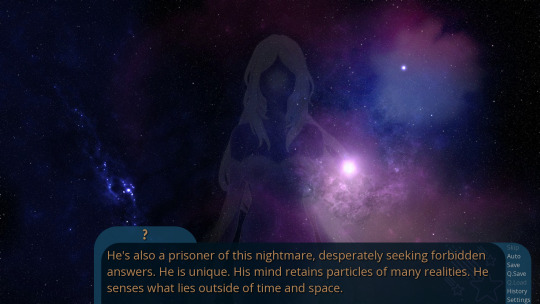
Overall:
Visual: 4/5
Story: 4/5
Characters: 5/5
Romance: 2/5
Originality: 5/5
My Rating: 5/5
(I can't recommend it to anyone, since it is very dark and not for everyone, but also couldn't give it less than 5 stars, because I'm sure that this game has a powerful impact on every person who has read it)
You can get this visual novel by Arewar on Steam or on itch.io
#particles of reality#yandere#visual novel#otome#video game#video games#dark romance#my review#personal#Tiger Mousse
66 notes
·
View notes
Text
Why Does My Microwave Have Wi-Fi?
In the not-so-distant past, microwaves were simple creatures. You pushed a button, turned a dial, or maybe pressed a few overly sensitive touchpads, and voilà—hot food. But modern microwaves, like much of today’s technology, have evolved far beyond their humble origins. Now, they boast features like Wi-Fi connectivity, voice activation, and apps that can supposedly “enhance your cooking…
#Alexa-enabled appliances#Internet of Things#IoT absurdity#modern microwave features#smart appliances#smart home satire#smart kitchen gadgets#unnecessary tech#Wi-Fi in household items#Wi-Fi microwave
0 notes
Note
can you write something with Patrick bateman pls!! it doesnt have to be serious i want the reader to be like totally stupid, it can be satire if u want!
no nsfw please i just want him to brutally murder me
thank you ily🫶🫶🫶
Double-face ♯ OS
Pairing; Patrick Bateman x Reader
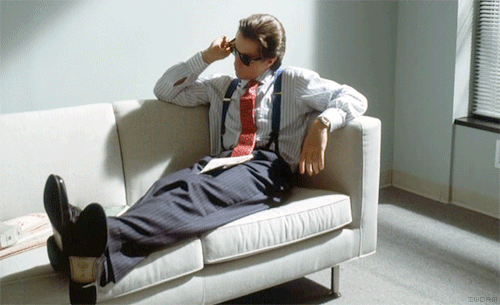
જ⁀➴
WC: 703 Summary: Your friend Patrick came to visit your house, clueless you invite him in. Warnings: Mention of murder, manipulation, creep, dumb reader, Patrick being cocky and weird A/N: i'm sorry bestie that i'm so late for your request but here it is finally! ! !
જ⁀➴
You walked around your room, couldn’t think of anything else than Patrick. His way of talking, thinking and his looks hypnotized me. People didn’t get along with this man easily, but off the bat you had liked his weird way of approaching you. Never denied him or judged him.
You bite onto your lower lip waiting for the sound of the car tires and loud motor noise of it. A knock on your door could be heard, and you left the spot where you were and ran to the door, swinging it open. You were met with his smiling and enthusiastic face. Your hands held tightly to the door knob, palms sweating and not knowing what to say nor to do. He let himself in without any problem and walked around.
“I must say, the house is pretty clean” He looked at the shelf of books and plants. You smiled behind him, loving his compliment and presence in your home. You were met with his face again, arms behind his back. “You know why I’m here, right?” Confusion was written all over your face, the question didn’t seem to lead anywhere, so you sat on your couch. He walked fast behind, following you onto the couch. He pulled something from his trousers pockets and pulled a key. “See this key?” You nodded and followed it with your eyes, “It’s a key to many secrets and depth, just like my heart” He held the key to his heart, enhancing the dramatic act upon this small object. “It must be very important to you” He nodded, putting it away and sighing. “You’re the only one that understands my words, my analogy. I like you”
You had turned on the TV, so the atmosphere would be embarrassing with you two not talking and just staring at each other, Patrick hasn’t said anything for a while, just looking straight ahead. He wasn’t much of a talker, he sometimes had many amazing tales to tell, but today wasn’t it. You never blamed him for that nothing quite extraordinary happened your way, too. The TV was a great alternative so we could both watch something together and find a subject to start a conversation.
The channel that we were on was casting a woman who was explaining her paranormal house, that she might think was haunted. Patrick chuckled, amused by her stupidity and worries. “Who fucking believes that shit, huh?” You knew that he was smart and knew everything, you would never try to oppose to his opinions. “Women like her would get killed eventually from saying such insanity on Television” His words felt average, as if it was normal to say that, they did in fact sound cocky, but It came from him. You couldn’t believe that Patrick had something more sinister in mind to what he said earlier, even though during his speech he looked straight at your face and not the woman.
“It’s getting pretty dark outside darling” You looked through your curtains, you haven’t noticed the time passing with his presence by your side. You got up and offered him his coat. He took it, slowly wearing it. “It was nice having you” You spoke, cheeks heating up from timidness, and he chuckled. “I really enjoyed it. I did” His hands were raised in front of me to amplify his gratitude, eyes looking around your home. “Add a tint of red, blood-red to your walls, they would look hypnotizing” You looked around the room and noticed just now the emptiness of color, you mentally noted that and went to get your keys to open the door. “A great pleasure to see my favorite person today”
You didn’t know that day Patrick had murdered someone that worked with you earlier before meeting you, you haven’t noticed his stained shoes and his bloody fingernails. Befriending him made you dumb, unaware of your surroundings, and clearly he took that onto account, and played with it. He wouldn’t murder you, couldn’t dare. He would keep you as his priced rare jewel, killing his fun would be disappointing. Coming to your home unexpected was a right move, memorizing the house by heart and knowing what his next motive would be.
#ohhxdile#🎱⋆°。⋆♡#patrick bateman#american psycho#patrick bateman x reader#reader#oneshot#reader insert
31 notes
·
View notes
Note
Outside of Daniel and Terry who were great as always, this was a truly terrible season, THE worst lol.
Johnny was truly horrible with his "suPpoRt DeVoN aND mIGgy dUriNG thIS DiFficULt time" but never did ANYTHNG to support HIS OWN SON. Like, he did NOTHING FOR ROBBY. Robby is struggling so badly and has no one to turn to and his OWN DAD is like "lOl roBbY wHooO???" Johnny is a terrible character and has been gaslighting himself and everyone else from SEASON 1! FUCK Johnny!
They ruined Chozen in every way by making him into this drunk, boorish loser who randomly hooks up with the enemy (another flat, annoying character and another poorly written female character). Chozen was so OOC I felt like I was watching badly written fanfic come to life. What the FUCK! I am so sorry, Chozen. You deserved so much better.
Kreese was just plain embarrassing, my god. Every time he was on screen I cringed. He should have died in S5 and I stand by that. Everything he did was mortifying and humiliating. He is way too old to be acting the fool. He needs to be in a retirement home having angry dreams.
Robby...LOL. The writers said fuck you! we don't care about you AT ALL lol! and then he got supremely fucked by the narrative in every single way. God. And of course NO SCENES with him and Daniel because flawed as Daniel was, he did so much for Robby--way more than Johnny ever did for him. Daniel and Robby had wonderful chemistry and the writers are so scared of that.
The Sekai Taikai is boring and overlong and just ridiculous in every way. All the new characters are dull, flat, and have incredibly forced and tropy "chemistry" with the OG characters. They are the definition of Shonen Manga Stock Bullies. They're like parodies of character tropes at this point. If someone told me CK6 was satire, I would have believed them.
S6: Let's make Daniel have an emotional breakdown again because why not hahahaha! BTW, Johnny is cool and perfect and a REAL MAN! BE LIKE HIM!!111!1 Johnny is absolutely not wrong ever, but Daniel is evil and flawed and ALWAYS wrong OF COURSE1!111!!
Annoying little brat Devon gets a pep talk from Johnny (another huge LMAO!!!) and gets away scot free with all she's done?? While Kenny still has to deal with the bullying he'll surely face back home?? What the fuck?
Carmen...DEAR GOD. This is the woman who raised a sweet kid by herself in a new country. She learned a new language, escaped from a terrible man, built a career and took really good care of both her mom and her boy. And then she, responsible, smart, kind Carmen--gets knocked up by a deadbeat, drunk loser who has held a grudge over a high school karate tournament for 30+ YEARS, blames everyone (especially poor Daniel who is his personal punching bag) but himself for how shitty his own life is, doesn't have a proper career or a steady job AT 50+ YEARS OLD, is in and out of trouble constantly, behaves like every negative stereotype of Ugly American even while IN the States, gets (Carmen's) son in trouble, does shit all for his own son, and...THIS IS THE MAN CARMEN GETS KNOCKED UP BY!!!!!!!!!!!!!!!! Carmen, who WORKS IN HEALTHCARE and has ACCESS TO BIRTH CONTROL!!!!! You cannot make this shit up!!!!!!!
This show is truly garbage. It was excellent in S1 and S2, I thoroughly enjoyed S3, S4 and S5 were Karate Star Wars and got stupid (but still entertaining) and S5 it should have ended, peaking with the relationship between Terry and Daniel and the death of Kreese. S6 is embarrassing and cringe.
The best parts were TERRY FUCKING SILVER who is played with such devastating charm and skill by Thomas that you can't help but love him. And he's hot as fuck so there's that too!
Daniel is of course hated by the writers, but that doesn't take away from the fact that HE'S BEEN RIGHT FROM THE START OF THIS FUCKING SHOW and he's a good, kind, sweet, hardworking man who happens to have a quick temper, can be prone to hot-headedness, and be (gasp) less than perfect. Of course, for these oh-so-terrible sins, he must be punished and also constantly fucked by the narrative. Jokes on them, because Daniel can be proven to be right and correct 95% of the time, and remains a decent, good man who can admit when he's wrong (UNLIKE CERTAIN BLOND FUCKS).
I'm just here for Terry and Daniel!
Cobra Kai S6 is a fever dream of how a middle aged man with the emotional range of a young teenage boy would WANT the world to work, not how any human being would reasonably behave. Many men have written stories like this over the centuries and have been called geniuses; many women have written their versions - like Twilight - and have been called airheads, but anyway, it's all pure id at this point. I keep saying that TIG meanwhile writes his own part before signing on, because somehow I keep finding nuances in his character, like a compulsion to repeat his trauma with cages and a deep aversion to killing (which is interesting because I really do wonder what he meant to do to Kreese if not kill him).
You do have to give it to them that there are moments of awe inspiring insanity sprinkled throughout.
10 notes
·
View notes
Note
How would ddlc be better aro?
Oh good, I get to explain. You will regret this. 🌝
...On the offchance you're asking this without already knowing DDLC for some reason, I'll give a brief overview first. (Spoilers for DDLC, obviously. Can't really get around that.)

(Note: this game has... a Lot of trigger warnings. This essay will avoid just about all of them and certainly won't include any pictures of those moments, but will discuss arophobia, along with its role in Monika's suicide. Be wary if that may hit too close to home for you.)
So! This is a satire/deconstruction of the dating sim genre initially masquerading, a la Puella Magi Madoka Magica, as a sincere example. Your average schoolboy mannequin of a self-insert is pressed into joining the school Literature Club, where you'll befriend – and, inevitably, date – exactly one of the club's handful of members... excepting club president Monika, who serves as your advice corner. No matter who you choose, the game begins to devolve from there into gruesome shock horror and torture as both the love interests and the world of the game itself are maliciously edited to punish both you and the girl for your choice. After some time of this, Monika reveals that she's meta-aware and has fallen in love with you – not you, the character, but you the player – and has been driven mad by the knowledge that she's simply not coded to be romanceable, deciding that she'd rather burn the world (and all of her former "friends" in it) to the ground in order to trap you with no other options except her, even to the point of distorting her friends' issues in some really awful ways and messing with your computer files to make it look like she can really reach you beyond the game. The only way to proceed from here is to delete her file – which is to say, kill her. At which point she apologizes for going too far and brings everything back to the way it was, just without her in it... except whichever girl gets chosen to be the new president in her place is faced with the same meta-awareness – the reality that you/the player can only choose one girl – and Monika is forced to delete the world entirely because "no happiness can be found here."
Generally, so far as I can tell, this has largely been treated as an individual thing, any points to be taken from it applicable only to discrete, solitary units. Monika being "crazy" is kind of a meme, and seems to be what the bulk of the game's players walk away with. The game seems to intend itself to be a criticism of "anime" (as if this sort of "the women only exist insofar as they're 'best girl'" mentality only ever shows up in anime, or as if "anime" could be reduced to this one kind of genre, but yeah, I'll grant that there does seem to be a certain disposability promoted amongst – largely male – fans) and dating sims as a video game genre entire.
But I don't think reducing the problem to "dating sims" goes far enough. Let's talk about how an aromantic reading of this game could vastly improve how it communicates/the depths of its themes.
Who is Monika?
The game tells us she's the perfect older sister/mentor-type: pretty, popular, smart. Her understanding of herself as a character is fundamentally founded, then, in her relationships to others: you can't be popular, be good at socializing, unless you have people to socialize with. But if she's so popular, so perfect, if everyone loves her, then why are there only three other girls in the Literature Club? Because, explicitly, no one else exists. There may be silhouettes, enough nods to the outside structure of students and classes to establish this as being set in a school, but beyond the main characters here, nothing else matters. There are no classes to take, things to learn, teachers to lean on. All that matters is her friends in the Literature Club. And that's all she needs!
...Until you show up.

Suddenly, the balance is upset. Everything was fine when the club was all girls, but now there's a boy here and everything is spiraling out of control. All of her friends stop caring about anything but you. You get closer to any of them than she ever could and help them with problems they never opened up to her about. The world itself bends and contorts to shove you together with them at every opportunity, and she just... doesn't get it.
Can't get it. (There's something they have that she doesn't, something that sweeps them up in this giddy rush for your attention.) The only thing she has that matters, these relationships, and she's dropped with barely a word now that there's a romance in the offering. It's just fundamentally, metaphysically true that being chosen by a boy – to fall in requited love, to be dating – makes you more important, that anyone who loses this race may as well not exist, because being romantically chosen is the only thing that matters.
And Monika isn't a romanceable option.
The Crash-Out
It's important to remember that Monika and the rest of the Literature Club are friends. There's a rush to characterize her as evil, or sadistic, or just an outright axe-crazy murderess – you know, cruel and heartless, jealous and bitter... the usual arophobic stuff. If all she genuinely wanted was to cause the others pain, though, the entire ending totally fails. She brings the world back because she feels guilty and ashamed of having hurt them and wants them to have a happy ending. She ends the world again because she decides that's impossible so long as they're all fighting over you, and they Have to fight endlessly over you. It's in their code.
So why does she do [gestures awkwardly at what happens in this game] ...all that to them, then? Half as punishment, I'd argue – see above, about them dropping her/you making them drop her without a word, as though it were simply natural consequence – and half as an outcry against romance in general. "THIS is what you want?? Look at what you're doing to them. Look at how far they'll go for your precious ~L O V E~ – look at what you're doing to them. Look at what you've turned them into." They're all crazy – they've gone nuts for this. She's the sane one. She's the only one who can see what sort of eldritch monstrosity they've admitted into their midst, the thing rewriting their happy little world.
...It looks a lot like her, actually.
(Not) Just Monika
I mean, look at it objectively. You and she both have this meta-awareness, this knowledge of what the world is really like. She can meet you on a level the other girls can't. She exists in a way they don't. Maybe it's not that you're some kind of invader. Maybe you and she are the only real ones, and everyone else is too (simple/two-dimensional/stupid/in love) to matter. Maybe she matters most of all. Maybe, if this has to be a competition, she isn't destined to lose – maybe she's special, not broken; maybe she can win. (Maybe she can find the companionship she so desperately wants, maybe she can earn a place at your side and be able to trust that you'll never walk away from her the way her friends did, that's what romance means, right, together forever and you'll always come first ––)
But you... you care more than she does. About those same friends that she was so mad at for abandoning her – didn't she just do the exact same thing? Isn't she tossing them away for the sake of your attention, too?
...She's disgusted with herself. Horrified at herself – at the monster this promise-of-romance has turned her into, same as the others. And if she can't exist without hurting her friends, if she's doomed to forever be forgotten and left behind and to know that she is inherently less of a person because she does not have the same capacity to enter a romantic relationship... Well. Why torture herself? It would just be better for everyone if she faded away now.
But that doesn't work, is the thing. Faced with the reality that nothing she's known is real, that either she'll have to steal the affections of this extraplanar entity away and consign her friends to ruin or else fall herself, the next Lit Club president lasts only a mere fraction of Monika's time in the role. It's not Monika that's the problem. It's the entire structure of the world – the dating sim, sure, but take that for what the genre itself is an expression of. Hegemonic alloromanticism. The whole concept that people don't matter unless they're dating, that dating is the only thing that matters, that you can only ever just choose one and that relationship then holds everything to you, that everything (everyone) else may as well not exist. Everyone in the Lit Club is friends with each other. None of them can bear to leave any of the others behind as soon as it becomes clear that that's what they're meant to be doing. And since we can't just snap our fingers and erase the world, since striving for better in whatever small grains of improvement we can claw out will always be worth more than destruction, that means there's only one thing we can do:
Fuck romance. Make friends instead – and befriend everybody. Break the imposition that says you can only provide emotional support and intimacy to the single person you date and give every girl the help they need. Learn what you can about all of them. Love them all – what does it matter if you aren't dating? You're friends. That's just as important. And if reality says you can't, then change reality.
No one's getting left behind. We all matter.
💚💚🤍🩶🖤
#doki doki literature club#doki doki monika#ddlc#ddlc monika#aromantic#aromantism#arospec#ddlc meta#ddlc analysis#talkin' things
5 notes
·
View notes
Text
The Mini Interview with Porochista Khakpour

By Yasmin Roshanian
I first encountered the works of Porochista Khakpour in 2014. As an MFA candidate at Columbia, I was eager for Iranian-American voices in fiction. To read Khakpour is to carefully parse through works of fiction and nonfiction that unfurl family, identity, and Persian myth—I can remember devouring Khakpour’s second novel, The Last Illusion, feeling unburdened. She is a rare writer, and to see life and the Iranian-American experience through her astute and caring pages feels something akin to landing.
In Tehrangeles (Pantheon Books, 2024), Khakpour’s latest novel, the world she satirizes makes for a delightful romp. We meet the Milani’s, a filthy rich family living the (Iranian)-American dream. Al, the immigrant father, is a bombastic junk food tycoon. His wife, Homa, is reeling. As they raise their four daughters (Violet, Roxanna, Mina, and Haylee) in the terrain known as “Tehrangeles,” the splashy landscape of Los Angeles where Iranian-Americans reside (and thrive), the opportunity for their very own reality show slowly snaps the scaffolding of a home, unraveling everything inside.
It was a joy to speak with Khakpour over a Zoom call in May. We discussed the whirlwind of Tik Tok, identity erasure, and more. This interview has been edited for length and clarity.
***
The Rumpus: I want to unpack the absurdity of celebrity culture, and in particular, the terrain that has become influencer culture. Did you always want to write a novel about this world? What was appealing to you about exploring celebrity and social media?
Porochista Khakpour: I’ve always been very obsessed with pop culture. Anyone who follows my social media knows. Even if it's not about my writing, or my literary interests, I’m always commenting, or tuned into pop culture. I’m forty-six, and I think I’m pretty up on things that Gen Z knows about. That’s just always been my interest. Most of my books do have some pop cultural angle in them, but Tehrangeles is the most absorbing. I think I had to get to a place, and maybe it took my fifth book, where I wasn’t so concerned about sounding smart. I’ve already written the smart books; the deep and heartbreaking books. I don’t feel like I have to prove myself as much anymore. If I had done Tehrangeles as my fist book, I think I would have been too worried about it being called a beach read or being labeled as women’s fiction. I would have had all of these other insecurities. Tehrangeles allowed me to not only investigate the Iranian-Americans of that demographic, but it also let me get deep into this world of bubbly, frothy trash. I guess some people might call it guilty pleasures, but it sounds absurd to say that—it's such a big part of American culture.
The book is kind of a period piece, too. It takes place in the first half of 2020, and I had to dive deeply into the world of TikTok. I was already on TikTok for a while before that, and I’ve only started posting publicly there recently, but I've been lurking for ages. It’s an amazing place to go when you’re interested in pop culture and celebrity and all that, and it introduced me to the world of content creators and influencers. This aspect of contemporary pop culture allowed me to paint the characters in a deeper way. These girls are just children, really; they’re Gen Z, but they all have jobs that they take really seriously. They’re making money, even though they have money.
Rumpus: I appreciated the versatility on the page. The humor is electric and sharp, and the dialogue is so astute. At the same time, the novel is deeply poignant. You also include a section written entirely in Farsi, allowing us to further access the characters despite the boundaries of language. In terms of craft, what does it mean to use different threads to tell a story?
Khakpour: Iran is really important when I’ve been grappling with Iranian-American life. I haven’t been able to return to Iran since I was a young child. I was born there, and I lived there for several years, but I don’t ever really feel comfortable writing a work set in Iran. I only have limited knowledge of that. Obviously, I can imagine it, but it’s not enough for me. There are many writers who do that a lot better than me; who write very directly from that experience. Iran, in almost all my books, becomes a symbol of an impossibility. It’s always tied to yearning, and longing, and characters wanting to go back to a homeland that they’re separated from. I wanted there to be a real distance between Iran and Iranian-America. In the novel, there are moments where I have relatives and friends in Iran calling the family, and telling them that they’ve heard about certain events in the US, and their show, and I wanted the Iranians to be different from the family. I wanted there to be this really big cultural divide. That was important to me.
I didn’t think that I would get away with the section written in Farsi, either, but my publishers didn’t touch that at all. In fact, we just had this funny situation where we have a wonderful, well-known actress who’s Iranian-American doing the audiobook. She only speaks some Persian, and she felt that her Persian wasn’t good enough to read that whole section out loud. So, as we speak, my mother is in a recording studio in LA, reading the mother’s (Homa) part that was all written in Farsi. My dad, too, helped me write that part, because I didn’t want it to sound like my Persian. I could have written it in my Persian, but I wanted it to sound like someone of a different generation writing a little section on Iran, and nature, and things like that. I had my dad do a lot of it, and now my mom is reading it. It’s kind of a weird and unique thing for an author of books.
Rumpus: The last two books you published, Sick and Brown Album, were incredible works of nonfiction. How did it feel to revisit fiction? Was it muscle memory?
Khakpour: I love fiction. Fiction has always been my true love, and I would have never been a writer if it weren’t for fiction. It was writing nonfiction that felt a little bit like tourism. I was working on Tehrangeles the whole time through all of these books, and I thought that Tehrangeles was going to be my second novel. It's funny, though—my nonfiction is more popular than my fiction. It’s always been like this. The amount of readers my memoir Sick had is more than all of my books combined. The success of that book was slightly frustrating for me, because it kind of proved what I was worried about—ultimately, my greatest function for people was as a nonfiction writer. It’s nice to go back to fiction, though, to remind people that this is what came first and foremost, and what I will always think of most as writing. As art, really. Nonfiction as art feels a little bit secondary for me, even though the greatest nonfiction, of course, incorporates all of those craft elements that create great art. I compartmentalize pretty heavily, and it’s just a totally different mode to be writing in nonfiction. I just try to handle that in a much more straightforward way.
Rumpus: This is also one of the first novels I’ve read that incorporated the pandemic. It plays a large role in the story, forcing the characters to confront various aspects of themselves, and each other. I’m curious about what it meant to revisit those early months of lockdown, and how it functioned in this setting.
Khakpour: I’m someone who is interested in things right after they happen, and I want to read about life as it happens. There was a challenge, though, in writing a funny book about the pandemic. I wanted the book to obviously be satire, and to be fun, but my real life experience of the pandemic was purely horrific. I lost seven friends. I lived in Queens, New York, which was very hard hit. As I was working on this book, the soundtrack was just nonstop ambulances 24/7. I felt like I did with 9/11; I was in the center of the hard hit area, and it was very disturbing.
Ultimately, I was a character that doesn’t really exist in the book. Maybe Mina, to some degree. Mina is longing for a communal experience, and she’s trying to educate her family. And then you have someone like Roxanna, who does my worst nightmare, which is throwing a super-spreader party. That was also a fun climax for me. A book that has a super-spreader party as its climax seemed thrilling, because the odds of me ever being in that situation were zero. Then there’s someone like Haylee, of course, who is so young, and so impressionable. She basically loses her mind during the pandemic. She goes down the rabbit hole of conspiracy theory, and ultimately becomes MAGA. In looking at Iran and some of the responses with Gaza, people are seeing the conservative Iranians very visibly right now. Right in UCLA—the heart of Tehrangeles—the aggressors tearing apart encampments are conservative Iranians. There’s an assumption that the proper position as an Iranian is to be anti-Palestinian, which is insane. Their own internalized Islamophobia is such that it has to take any position that’s very anti-Iran. There’s a feeling that the family is kind of Republican, or Republican-adjacent, but Haylee is very blatantly conservative. It’s to the point where she keeps arguing with her sisters that she’s white, and Haylee wants to identify as white. Ultimately, she was one of my favorite characters to write, because she was just so different. I could write horrible things. That experience of writing things that you’re just so opposed to; that are so insulting to your total soul—in a sense, it was kind of thrilling. Writing her, and then trying to find a way to save her—it was a difficult tightrope act.
Rumpus: I want to explore identity erasure. With Roxanna in particular, we see what it means to reject her Iranian-ness completely.
Khakpour: I think the whole thing about Roxanna pretending to be an ethnicity that she’s not, which is the dramatic tension in her arc, is pretty real. People may think I made that up. It’s very surreal, and how could that really happen? But there are a lot of Iranian youth, I think, who pretend to be an ethnicity that they’re not, because Iranians often do have the luxury of passing for lots of things.
In all of our lifetimes, whether you're Gen Z, Gen X, or even a boomer—you know that there’s been a lot of anti-Iranian sentiment. This is especially true in the West, but it occurs everywhere. Even throughout the Middle East there is so much anti-Iranian sentiment. It’s very tempting for young people that are already very concerned about issues of identity to then just take that leap over there. I wanted Roxanna to be in this pickle where she’s built this other identity for herself, and it works perfectly that her last name works with it; her dad’s occupation, the fact that the sisters are spaced out in school… everything works out until the idea of reality hits. And that’s kind of a funny thing. We’re talking about reality TV, but we’re also just talking about reality. Suddenly, you have to be really real. Reality TV, of course, wants to exaggerate and embellish the real elements. How can they not talk about ethnicity? Now she’s just in a state of absolute terror about what she can do to make that work, and in the end, it kind of becomes a non-issue. Nobody cares that much, but to her, it’s the end of the world. There’s this whole reckoning with her boyfriend, who is Italian, and then it’s his forgiveness of her in the end, and what that all means… I think that it was a good conceit for a piece of fiction. And I think it’s also a very real thing. I think almost every Iranian I’ve ever known—whether for issues of protection, or whatever it could be—has pretended to be someone they’re not. I’ve done it before; certainly around the 9/11 era. There were times where I felt unsafe. I would say that I was Italian. I think it’s pretty understandable, even though it's extremely comical.
***
Yasmin Roshanian is a writer and editor. Her work has appeared in The Rumpus, BOMB, Catapult, and elsewhere. She is at work revising a novel surrounding Iranian-Americans as they navigate college during the onset of the Obama Administration.
7 notes
·
View notes
Text
Excerpts from On Animation: The Director’s Perspective – John Musker, Ron Clements and Rob Minkoff
On Animation: The Director’s Perspective is a two volume collection of interviews with animated film directors. Included are interviews with John Musker, Ron Clements, two of the directors for The Great Mouse Detective, and Rob Minkoff, the supervising animator for Olivia.
John Musker
Bill: With all that animosity in the studio, how did you move on to direct Basil of Baker Street, or I should say The Great Mouse Detective?
John: At this point, Ron Clements had shown the book Basil of Baker Street, about a mouse Sherlock Holmes, to Joe Hale, and he liked it as a possible feature. It was decided that the malcontents on Black Cauldron should leave Black Cauldron to the other directors and form a small unit to work on Basil. Thus, Ron Clements, who was unhappy over the way the story of Cauldron was being adapted, was assigned to Basil along with me as director and veterans Pete Young, Vance Gerry, and writer Steve Hulett. And Ron Miller himself was going to personally produce it. This was Ron’s way of mentoring us I think. As I tried to shape the tone of the movie, I wanted to do more than put a mouse in a deerstalker cap. My tastes in British comedy at the time were heavily influenced by Monty Python and also The Goon Show (British absurdist radio satire with Peter Sellers and Spike Milligan that the Pythons themselves had grown up on). And that was part of what colored my initial version of Basil. Basil was very “John Cleese.” He was manic (and depressive), abrupt, smart, and lacked social graces. Instead of the violin, he played the tuba, a mouse-sized tuba. The homely Dr. Dawson was kind of an unwitting ladies’ man. The opening of the film was a Citizen Kane parody where the story was told in flashback by a wheelchair-bound Dawson, now residing in a home for shell-shocked veterans of the Afghan war. It was boarded by the great Joe Ranft, who gave it many of his idiosyncratically funny and heartfelt touches. After about six months, we finally showed it to Ron Miller. We had sequences on storyboards, nothing on reels. Ron absolutely hated it! He thought it was too “out there.”
Bill: So you made the wrong choice?
John: Yeah, once again. He basically said, “Start over.” For me, that was difficult. I didn’t want to do that. I wanted out. But I backed off and let it move in a more traditional Disney direction. Vance Gerry did wonderful work bringing more charm and warmth to the story, the look, and the characters. That was Ron Miller’s ultimate criticism of my version: “This is Disney! Where’s the warmth?” He had a point. My version lacked that. Joe Ranft did a classic drawing based on Ron Miller’s reaction where Ron looks sort of like Frankenstein and roars, “WHERE’S THE GODDAMN WARMTH?” I still have that drawing, 30 years later, pinned up in my room. It’s a good reminder. In the final film of Basil, I was able to still inject some of the edge that I thought was in Doyle’s own writing of Holmes, some of the Cleesian persona I thought amusing, but the film was tempered by the warmth Vance added. At this same time, Brad Bird, who had a falling out of his own a few years before and had exited the studio, was developing with Jerry Rees an animated feature based on Will Eisner’s classic noir detective strip, The Spirit. I loved The Spirit, had envisioned making a version of it myself one day. In my spare time, I helped Brad get the project going, as did Glen Keane and others. I did animation, storyboarded a couple of long sequences, and was ready to jump ship and relocate to northern California with Brad and Jerry if it got funding. Word of this got back to management. Burny Mattinson was elevated to codirector partly because of my lack of firm commitment to seeing Basil through.
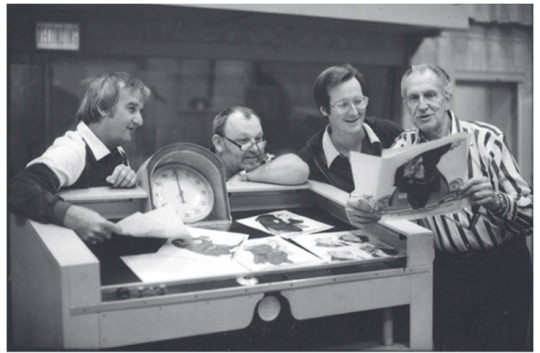
Bill: Then the sudden appearance of Eisner …
John: Sudden is right. But first, there were the threats of a takeover of Disney. Ron Miller was ousted and Michael Eisner and Frank Wells were brought in. And Roy Disney, who had earlier left Disney unhappy with Ron Miller’s direction of the studio, orchestrated Michael’s hire and returned to Disney himself. But we wondered, does anybody realize Ron Miller was actually producing Basil and now we are producer-less? We were like kids in a classroom who were the only ones that knew the teacher was never coming back. It was strange. For a moment, there was no supervision, no leader to look to. We were all in limbo. Shortly thereafter, we learned that we actually had to pitch the movie to Michael Eisner. Although we had been working on it for three years, it was very possible that it might get shelved in the wink of an eye.
Bill: Three years?
John: Three years in boards … I think we had a few reels. Ron was very distracted by the takeover attempts, and we were moving in slow motion. So we pitched Basil on beat boards to Michael Eisner, and he says, “OK, I see you got the comedy and the adventure. But what’s going to make us cry? You need something to make us cry.” He starts talking in a way that I never heard Ron Miller talk. He then calls in Jeffrey Katzenberg, and we show him everything that we have. This is our first meeting with him. Jeffrey looks at our bar room sequence, one where a plaintive woman mouse sings a Victorian ditty that gets a bit bawdy. Jeffrey’s response: “Why can’t we have Michael Jackson do a song for it?” We were totally thrown. Michael Jackson? Victorian England? It was then we realized that we were not in Kansas anymore.
Bill: Thinking outside the box.
John: There was no box. In hindsight, Jeffrey’s thought was not so wacky. It was risky in a kind of cool way (although hiring the biggest pop star on the planet to do a song isn’t entirely daring), but it was another universe than the Disney we had been working for. So they greenlit the movie, but cut the budget in half and gave us half the time. We had to knock a year off production and do the movie for ten million dollars, which was a tight squeeze budget-wise even then. Our roles also got shuffled around. Burny Mattinson was now producing the film, and Ron and Dave Michener became codirectors. I wasn’t the sole director anymore. I answered to Burny now. It wasn’t necessarily an ideal situation for me. Fortunately, Burny was very supportive, collaborative, and generous all in all. He was open to ideas, and had some fun ideas of his own that sent the movie off in a better direction. And in the meantime, Brad never did get The Spirit off the ground.
Bill: Is this when you and Ron began to work together as a team?
John: I think our teamwork was forged on Black Cauldron, as it were, ironically enough. We discovered we shared much of the same tastes in storytelling and writing. This was further amplified as we collaborated on Basil. I had always known Ron as an animator. He was a low-key guy with a good head on his shoulders. During the Bluth days, as much as Don tried to entice him, or anyone else for that matter, he was the guy that said, “Don’t drink the Kool-Aid.” No matter what, he would question something if it didn’t look or feel right. And on Black Cauldron, we learned that we had similar ideas about how to adapt a book into a film and how to take a character from the page to the big screen.
Bill: But you ended up finishing The Great Mouse Detective.
John: We did. To us, though, it was always Basil of Baker Street. That’s what we called it.
Bill: And it did OK at the box office, right?
John: Well … it got really good reviews. The studio was excited. But both Jeffrey Katzenberg and Michael Eisner were disappointed with how much money it made. People liked it. It was Glen Keane’s first chance to really design and develop a character, which he did with the villain Ratigan. It was a step in the right direction, especially after Black Cauldron.
Bill: And it set you on track to helm The Little Mermaid.
John: It did. Ron was the one that pitched The Little Mermaid. He found the original Anderson story in a book of fairy tales he read in a bookstore in North Hollywood, the Paperback Shack. He was in search of ideas for features to pitch at a “Gong Show,” a meeting with Jeffrey and Michael designed to unearth new ideas for films, a vehicle they had used at Paramount. Upon reading Mermaid, Ron loved the story’s visual qualities. In terms of animation, it had great potential, and he wondered, “Why has this never been made into a film?” Then he got to the tragic ending, and said, “Now I know.” Ron wrote a two-page outline of his version. After some delay, Michael and Jeffrey liked it enough to put it into development as a feature. It ultimately languished, waiting for Michael Cristofer, a fine actor and writer of Witches of Eastwick and writer-director of Gia, and a person whose tastes ran toward the dark side, to write Little Mermaid. He never quite got going on it, so Ron asked me if I would be interested in writing it with him, the two of us having collaborated amicably on Basil and Cauldron, if he could get Peter Schneider, who really ran feature animation for Jeffrey and Roy, to agree. Ron’s pitch to Peter was we’re here, we’re cheap, we’re rarin’ to go, whaddya got to lose? Peter said OK.
---
Bill: With all this consistent collaboration, what would be an example of something that’s all yours?
John: Well, the caricatures I draw reflect a point of view that’s all mine. I also made this three-minute film piece for Joe Ranft’s funeral, a tribute to a great friend and an exceptional talent and human being who died too young. I drew and edited the whole piece. I was encouraged to post it on YouTube on Joe’s subsequent birthday, which I did. People can track that down to maybe get a little feeling for what Joe was like, and what he meant to me and the people around him. It pleased me that the people who knew and loved Joe could see him in that little film. In general, it pleases me when something you labor over seems to resonate with an audience. They see themselves in it and connect to the emotions.
Bill: I think you’ve succeeded. Mermaid, for example, was such a success. The audience just kept coming back to see it.
John: Yeah. I don’t think Michael Eisner initially saw animation as something that could be financially successful. Black Cauldron, which was their intro to Disney features, had cost a lot of money and not done well. I think Michael was quoted in one of the early press pieces as saying Disney needed to continue making animated films because of Disney’s legacy, but they weren’t expected to make money. When someone remarked how expensive an animated film was to produce, I think he was actually quoted as saying, “These are expensive to make, but we have to do it. It’s sort of our thing. It’s our obligation almost.” I don’t think Eisner initially saw animation as a big source of revenue. He just wanted it to break even. Jeffrey, who had not grown up around animation at all, saw it, I think, as a challenge to make it financially successful. Although Basil wasn’t particularly successful financially (so much so that a disappointed Jeffrey told us he thought the ticket prices for animated films might have to be raised to make them profitable), Spielberg and Don Bluth produced An American Tail, and it did better at the box office. It was very much made for a family audience. Even I went to see it on opening night, but it was sold out! I couldn’t believe it. Ultimately, its success helped us convince Jeffrey to put more production value into The Little Mermaid. Mermaid was definitely a surprise, even for Jeffrey. It expanded the traditional audience for animated films. It even became a kind of date movie for teens and adults. Of course, there was Roger Rabbit too, which came out before Mermaid. But Howard and Alan’s music for Mermaid was so infectious, smart, and fun that animation became kind of cool. And that gave us momentum. It moved the production of new animated films forward. Obviously, not everything hinged upon the success of Mermaid. But Rescuers Down Under and Beauty and the Beast were in development in various stages, and the success of our movie gave momentum to them and other upcoming projects (as well as increasing expectations for them, both creatively and financially). As Mermaid was winding down, but before it was released, the studio actually wanted Ron and I to take over Beauty and the Beast from the original director, Dick Purdum. He was a talented British-based animator who had been saddled with an early draft of the script that Jeffrey loved. He was told not to change a word. When Jeffrey disliked the reels that emerged from the “perfect” script, there was an emergency confab in Florida during the Mermaid press junket. It was there that Howard pitched his version of the story, which handled the characters and the tone (as well as plot elements) considerably differently. He pitched the villain Gaston being a hunter rather than a fop, and his Belle was an imaginative, independent lover of books out of step with her provincial neighbors. He thought the mute, enchanted household objects, which had once been human servants, should not only speak, but should sing and dance. And new directors Kirk Wise and Gary Trousedale and their great story team of Roger Allers, Brenda Chapman, Chris Sanders, et al., brought their own ideas to the project and brought it all to spectacular life (and we had nothing to do with it!).
---
Bill: What was one of the toughest moments in making Aladdin?
John: We had a screening for Aladdin, the famous Black Friday screening. Ninety minutes of story reels, our first pass. On Basil, Jeffrey had shut the reels off after ten minutes when he wasn’t engaged and refused to watch the rest until we had a more compelling opening. These reels of Aladdin he watched in their entirety. At the end, his only comment was, “That’s a lotta movie,” and off he went. Ron and I lunched at El Torito, a little uncertain what to make of Jeffrey’s reaction, but cautiously thinking the screening seemed to go OK. After lunch we went to see Don Ernst who was our producer. “Any further word from Jeffrey?” we asked. “He hated it!” Don replied. What!? When we asked Jeffrey later why he hadn’t shut off the projector as he had on Basil, he said, “I got too much respect for you guys to do that. But I gotta tell ya, I was so bored I spent the entire screening working on the guest list for my wife’s surprise party!” So on Good Friday, even though the studio was closed, we came in to meet with Jeffrey. He said, “Listen guys, Steven Spielberg just made Empire of the Sun. The script, however, didn’t work. He went out, he shot it, edited it together. And guess what? It still didn’t work! But had anybody told him the script didn’t work? No! Because he is Steven Spielberg. Guys, I’m here to tell you, and I think of you as the Steven Spielbergs of animation, you just made Empire of the Sun.”
---
Bill: The Genie gets so much attention, but the animation for the magic carpet was even more amazing.
John: Randy Cartwright animated the carpet. It was the first time, I think, that we used texture mapping. Neither Ron nor I is particularly technologically adept, but we were trying to stretch the boundaries, just like we did on Great Mouse Detective. If someone had an idea how to use technology in a cool way, we were open to trying. On Great Mouse, it was Mike Peraza and Phil Nibbelink who kept saying, “Wouldn’t it be cool if …,” which led to the interior of Big Ben being done on the computer. On Mermaid, Tina Price pushed us to make Eric’s ship a CG [computer graphics] model (which it is only in that first scene coming out of the fog). Tina was also involved in “roto-ing” Randy’s hand-drawn animation of the carpet and warping the intricately patterned carpet texture to fit the acting and movements that Randy created. Still, we had to sell this to Jeffrey. We loved getting this intricate pattern on the carpet, but according to the accountants, it was going to cost a lot of money to do this. Jeffrey was incredulous: “I’m paying all that dough for a bunch of squiggles?” He didn’t get it. But we fought for it and he gave in. I was very happy about that victory. Randy really “was” the carpet, or vice versa. I remember Randy acting out the scene as the carpet sadly slumps away after Aladdin dismisses it in the cave. I still see Randy doing it when I watch the carpet do that in the movie.
---
Bill: If you could go back in time what advice you give yourself about directing your first feature?
John: If I could go back in time to Great Mouse Detective, the first feature I directed on really (I don’t think I can count Black Cauldron …) and advise myself about it, I’d caution myself to remember that the audience has a lot of material to absorb about characters, their problems, the world they live in, and the rules by which that world operates, in a very short amount of time. So extra care must be spent to make sure all that information gets communicated clearly and entertainingly. At times, the younger “me” might try, like younger animators sometimes do, to put too much into too little time, thus making it harder for the audience to jump aboard. I’d also remind myself to leave breathing room so there is a variety of pace, let some things should play out more slowly to give contrast in the film, which helps keep the audience engaged. And I’d remind myself how lucky I am to be doing this.
Ron Clements
Bill: Pastels, right? After all, no Photoshop back then!
Ron: Pastels, magic markers … and a hot press. I learned how to work a hot press. I shot a lot of slides. For every piece of artwork you did, you had to shoot a slide. And it would all end up on camera. I was still very interested in animation, though. I even brought in my Super 8 films and suggested we could do some commercials. In those days, everyone thought animation was a very expensive business, that without a bunch of fantastic equipment you couldn’t do it. My little Super 8 films proved otherwise, so I convinced them. Soon I was making little animated commercials. They even built an animation stand for me, which they let me use on my own after hours. When I was 18, I made a 15-minute animated short called Shades of Sherlock Holmes. It was in color. I did all the animation, cels, backgrounds, voices, and soundtrack.
Bill: Did you have pegs?
Ron: I had pegs … just two pegs. I did it with a two-peg system. They were just little wooden dowels. I punched the paper and cels with a regular paper puncher.
Bill: You made it yourself?
Ron: I made the cells. I painted them. I did everything.
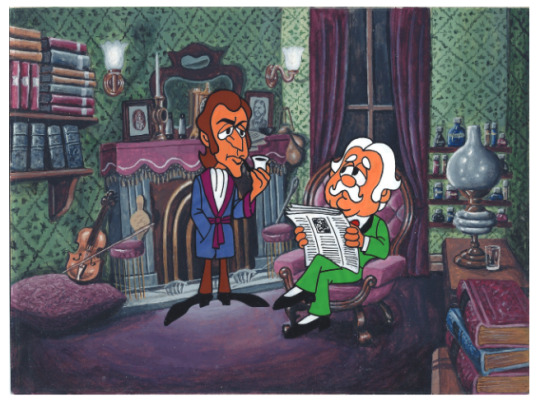
---
Bill: Do you remember your first tests?
Ron: My first test did not go that well. Eric Larson suggested that I do something with Sherlock Holmes, since my film featured that character. But my design was not at all a Disney-type design. I was frozen for three weeks. I was actually working on a walk cycle for three weeks. In the fourth week, I added a Watson character, who was a little King Hubbert–ish. I had more fun with him. But it was close. They saw a little spark with what I did in that last week, so I got to stay. That was enough for me to relax and start to feel more comfortable. Then I did much better on my second test, a test with the rabbit character from Winnie the Pooh. They liked that test. Before I knew it, eight weeks had passed. If you could make it through that, they hired you. That was the official start of my Disney career. I was an in-betweener at Disney working on Winnie the Pooh and Tigger Too, a featurette at that time. And even though I was officially employed at Disney, I still did personal tests in my spare time. I had a fairly ambitious idea to do one with Cruella De Vil. It went over really well. Frank Thomas and Ollie Johnston came into my room after they saw it and sort of bowed to me. That was probably the biggest thrill of my entire career. Suddenly, everyone at the studio knew who I was. It was definitely a transformative moment. At the same time, I was still scared. That test went over so well. But honestly, I still didn’t really know what I was doing. Frank asked me to work with him. He wanted to be my mentor. I had originally thought about working under Milt Kahl. But I soon learned that Milt didn’t really mentor anybody. You dealt only with his assistant, Stan Green. Working with Frank was a fantastic opportunity. He was a brilliant animator, actor, entertainer … just an incredibly smart, talented guy. I learned a lot from Frank as I became an animator on the Rescuers. Back then, there were only a few books on the animation process, such as the Preston Blair book, and Frank and Ollie wrote an amazing book after they retired. But animation is something you learn best from working with someone. You can get the ideas and concepts from a book. But in the end, you need a mentor, someone who can teach you how to do it, how to become an actor with a pencil. For me, that was Frank.
---
Bill: When did you begin to work with John Musker?
Ron: Despite being one of the young rebellious CalArts guys, the studio made John a director on Black Cauldron. It was the idea of Tom Wilhite, a young executive who was open to new ideas. The older directors didn’t like that at all. After Frank and Ollie left, Don Bluth was running the show. But he clashed with the CalArts guys. They had different ideas and were not afraid to express them. Brad Bird was particularly outspoken. A schism developed quickly. Finally, Don Bluth and his people quit. The studio was then left with a bunch of talented, but unruly young talent, which could be quite scary for a fairly conservative company. Ron Miller, Walt’s son-in-law, who was now running things, thought the answer was to bring us all together on Black Cauldron under a group of older guys just promoted to director. But I don’t think that was a great experience for many of us. There was now a new schism between the younger and older guys. So John was pushed into the role of director and was also working on the story. That’s when we started to work together. I was also assigned to work on the story. That was my first time working with storyboards, and John and I had very strong ideas about the overall momentum of the narrative. But I think the older directors just wanted us to board the sequences and let them worry about the overall story.
Bill: Is this when you and John bonded?
Ron: Pretty much. We had similar ideas. Unfortunately, most of those ideas were not shared by the other directors. Eventually they put us in a room to work on stuff that was never going to be used in the movie. It was “additional story,” that is, story never intended to be used. That was a bad experience for both of us, but we discovered we did have a lot in common. We were almost the same age. We were both raised Catholic, and we were both from the Midwest. We both were even cartoonists for our school papers. John was also an incredible caricaturist. And caricature was what helped to eventually land me at Hanna-Barbera and then Disney. It was easy to be friends. Anyway, we were both put on probation on Black Cauldron.
Bill: They took you off the picture?
Ron: No, we were on the picture. But we wouldn’t be for long, if we didn’t change our attitude. It was that kind of probation. But it didn’t matter in the end. Joe Hale was the producer on Black Cauldron. He was very sympathetic to our group, but ultimately he had to choose between us and them. He chose the older guys. I guess it was a good thing, because there was no project slated for development after Black Cauldron. Since I’ve always been a big Sherlock Holmes fan, I had come across this book called Basil of Baker Street, which was about a mouse Sherlock Holmes. I thought it was perfect for a movie adaptation. But I was working on the Rescuers at the time and didn’t pursue it. Well, now seemed like the perfect time to pitch the idea. I brought it to Joe first, and he brought it to Ron Miller. Ron not only wanted to make the movie, but he also saw an opportunity to put all these young disgruntled people to work on an alternative project to Cauldron. So John became the director and I worked on the story. Later, Burny Mattinson was brought on to keep us from going too radical. Basil developed slowly over the next year and a half. Then everything changed overnight. Saul Steinberg, who was a corporate raider, was trying to take over Disney. Evidently, if he succeeded, he was going to dismantle the company and make a huge profit. All of us working on Basil had no idea what was going to happen. It was a precarious time. Finally, Roy Disney and the Brass brothers came in and saved the company at the last minute. And Ron Miller left. Bill: So, Eisner and Katzenberg came in.
Ron: Sweeping changes. For a time, they didn’t even know we existed. We were such a small group, and Ron Miller had been our producer. We used to joke about whether we should tell anybody we existed. A lot of stuff happened at this time. There are a lot of stories.
Bill: We should stay focused on your personal experiences.
Ron: We had to pitch Basil all over again to Michael Eisner and Jeffrey Katzenberg. It was weird. We had worked on this film for a long time. Suddenly, we had to pitch it as if it were a new idea. Well, they liked it. It was greenlit. But Michael reduced the budget and gave us a strict time frame. We had ten million to spend, and we had to finish in about a year. So, we did.
Bill: You did Basil in a year?
Ron: We did. But we had previously worked on the film for over two years, so we had lots of boards, reels, and the cast. We jumped straight into production.
Bill: Basil himself is a manic-depressive. How different was he on the screen from what you guys originally envisioned? Didn’t they ask you to tone it down a little?
Ron: We had to tone it down. That’s why Burny Mattinson was put on the picture. Basil was indeed manic and eccentric. And we pushed that even more early on. Burny carefully pulled us back, allowing for some eccentricity and quirkiness, but nothing too extreme. The film was done very fast. Fortunately, it was animals wearing clothes, which is probably the easiest kind of animation to do. Everything turned out for the best, I think. Black Cauldron was costly and took four years to make. We finished Basil in a year, it was cheap, and it did better at the box office.
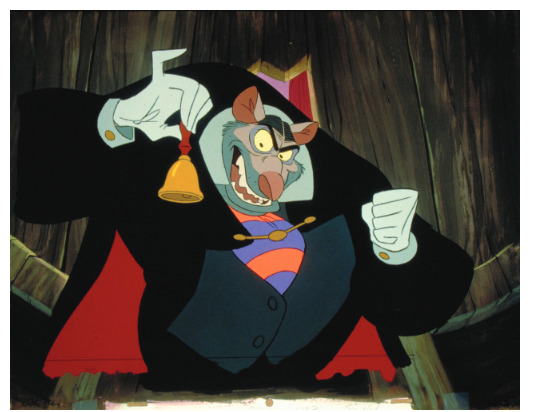
Bill: Don’t forget to mention the name.
Ron: Well, we did hate the title change. To us, it was always Basil of Baker Street. But there was a marketing issue. Eisner and Katzenberg had come to Disney from Paramount, which soon released Young Sherlock Holmes. Big names were associated with that film: Steven Spielberg, Chris Columbus, Barry Levinson. I think Basil was greenlit because they were still riding high on that movie. When it finally came out and didn’t do that well, Eisner and Katzenberg were worried about any association with Sherlock Holmes. So the title was changed to The Great Mouse Detective. We hated that name.
Bill: What about the secret memo?
Ron: I don’t think it’s a secret now that Ed Gombert wrote that memo. He was a very talented story guy at the time. Peter Schneider was newly installed as the head of production, and the fake memo was attributed to him. It basically said, “Not only are we going to change the title of Basil of Baker Street to The Great Mouse Detective, but we have also decided to go back and change the titles of all previous Disney films. From this point on, Snow White and the Seven Dwarfs will be Seven Little Men Help a Girl; Pinocchio will be The Little Wooden Boy Who Became Real; Cinderella will be The Girl with the See-Through Shoes.” I think he changed all the titles except the Aristocats. Peter was incensed! They wanted to fire whoever wrote that memo. Eventually, it died down and nobody got fired. But that memo has a life of its own. It was eventually the basis for a Jeopardy! question, and the LA Times wrote an article about it.
Bill: Were you and John the sole codirectors of Great Mouse?
Ron: No. Burny and Dave Michener were also directors. John and I were sequence directors. And as for me becoming a director, I should backtrack and say that it was due to Ron Miller leaving. He was the original producer. When he left, Burny became the producer. But he didn’t feel he had time to both produce and direct, so they were looking for another director. I asked Burny to consider me, and he went with that. I guess that was my big break.
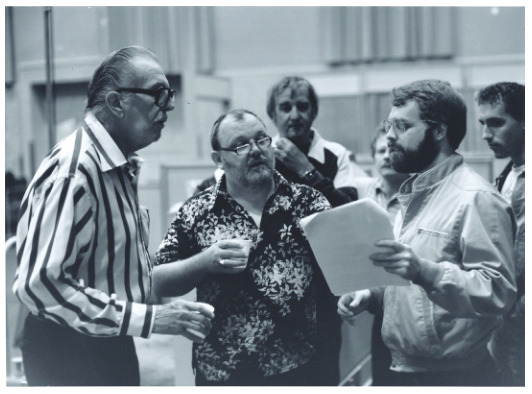
Bill: Did you and John do sequences together?
Ron: No, and we still work that way. We split a movie into sequences and then divide them up. We don’t actually work on the same sequences. That’s always been part of our process. There was also no screenplay on that movie. Most of the Disney movies didn’t have one at that time. We did our own writing for the sequences that we boarded. Somehow, we were able to maintain consistency. We both did a lot of writing on Basil. And that reminds me of the “Gong Show,” which was something Eisner brought with him from Paramount. Occasionally, they would gather a lot of the creative people at Paramount to generate new material by simply pitching ideas freely. This was called the Gong Show because the response required a simple gut reaction, yes or no. So we had to do this too. A bunch of us had two weeks to each come up with five ideas to pitch. As I was looking around for ideas, I found this book of fairy tales that included The Little Mermaid. I’d heard of it, but never read it. It didn’t take long to discover that Hans Christian Anderson’s writing was very visual, almost cinematic. It leapt off the page. There was so much potential, I was curious why it hadn’t been made into a movie yet. But as I read further, I could see why. It’s a story that starts out sad, and then it gets sadder and sadder. Then she dies in the end. Depressing, but it intrigued me. A few days later, I had an idea. I thought of making the witch a villain and putting this sort of ticking clock in the story. I wanted this ironic twist where the prince falls in love with her voice, but she gives up the voice. And I had a way to give it a happy ending. I got so excited that I couldn’t sleep. I wrote up two page treatments on five different ideas, but I thought Mermaid was the best. Two weeks later, when we gathered, Michael asked us to pitch our best idea, not all five. When I said The Little Mermaid, they immediately said, “No. That’s too close to Splash.” Nevertheless, they said they would read all the two page treatments. I was very disappointed. Then, two days later, Jeffrey Katzenberg said that he and Michael saw potential in The Little Mermaid. They wanted to put it into development. And for a while I was sort of in charge of that.
Bill: Was John involved with it?
Ron: John was not involved at this point. They were focused on finding a writer. Initially, they wanted Michael Christopher, the Pulitzer Prize–winning writer on the Witches of Eastwick. He was interested, but then backed off because he felt his take would be too dark. That’s when I went to John and suggested that we collaborate on the screenplay. We pitched the idea to Peter Schneider and he agreed. The Great Mouse Detective was also coming to an end, so both of us were looking for a new project. At the same time Jeffrey Katzenberg, prompted by David Geffen, was trying to lure Howard Ashman to Disney. They showed Howard a number of things in development, both live action and animation, and he was most interested in writing the songs for Mermaid. We met him in New York with a 12-page treatment and, for two days, we went over it, figuring out how and what songs could be worked into the story. And Howard a great idea. Howard went on to direct the musical “Smile” in New York while John and I returned to California and wrote the script.
Rob Minkoff
Bill: How long did you stay at CalArts?
Rob: I was there for three years. At the end of my second year at CalArts something kind of devastating happened. Disney didn’t hire anyone. That was a huge blow to the students. In my first year they hired nine people! That got us excited about our future prospects—then, suddenly, nothing. Worse still, rumor had it Disney didn’t like our films. Apparently, they were too dark.
Bill: Your sophomore film?
Rob: Yeah. It was kind of a Hansel and Gretel story. This devious candymaker invites two kids into his store in order to turn them into candy. He literally is going to pick them up and toss them into the candy-making machine. Well, I suppose it was a little dark. But we can probably thank Tim Burton for that! In our first year they showed Tim’s pencil test, and it was amazing. This little film essentially displayed every major concept that Tim is now known for. It was called Stalk of the Celery Monster. That film had a profound effect on us.
Bill: Did that influence your third-year film?
Rob: Well, before that, and after Disney chose not to hire anyone, Dan Jeup came in and announced that three people had been selected to do an internship. I was one of them. We got to do a summer internship with Eric Larson in the summer of 1982. This happened to coincide with the animation strike. No one was in the building because they were all out on the street picketing. That made the experience very strange. We actually had to cross a picket line to get inside the building. We weren’t scabs because we weren’t employed per se. We were just interns. But the nice thing was that we had Eric all to ourselves. He literally had nothing to do but teach us. At this time I also met Don Hahn, Ron Rocha, and Burny Mattinson, who wasn’t picketing because he was a director. Mostly the place was empty, and that gave us an opportunity to do something we couldn’t have done otherwise. We went into everybody’s office and looked at their stuff. We looked at Ed Gombert’s boards, Vance Gerry’s boards for The Great Mouse Detective, which at the time was called Basil of Baker Street. We saw boards hat Tim Burton had done for The Black Cauldron. One day we got very bold. We decided to march upstairs and meet Ron Miller. He had Walt Disney’s old office, and we just wanted to step into that room. So we went up to Lucille … Lucille was Ron’s assistant, right?
---
Bill: Was this the very early stages of Roger Rabbit?
Rob: Yeah, before Steven Spielberg and Robert Zemeckis were involved. Daryl Van Citters, Chris Buck, and Mike Giaimo had been working on it. They even shot a live-action test with Mike Gabriel as the detective. I was basically hanging out with these guys in the beginning. Joe Ranft had introduced me to them. I’d met Joe my first year at CalArts. He’d come back from Disney to give advice and critique the animation tests for some of the students. It was totally informal. Just something Joe wanted to do. We became very close after that. What an amazing talent and all-around human being he was. It was such a tragedy to lose him so young. I still think of him quite often. Anyway, I’d finally gotten a job at Disney and my first assignment was inbetweening on The Black Cauldron under Phil Nibbelink. It was a pretty tough job, except that Phil had all the cute girls working as his inbetweeners.
Bill: How long did that go on?
Rob: For about six months. To keep my sanity, I would take drawing breaks. I would stop inbetweening, pull out a fresh piece of paper, and draw something for fun. Then I would go back to inbetweening. After a while, I acquired a large stack of drawings, which sort of helped me later. There was a small group working on Basil of Baker Street—The Great Mouse Detective, that is. They were thinking about bringing in a new face for some character design work. Brian McEntee recommended me to John Musker. Eventually, John called and asked me to come to his office. He also told me to bring drawings. I reached into my desk, grabbed the stack, and walked upstairs to his office. About a week later Ed Hansen, who was running the animation department, called and said they wanted me as a character designer on the film.
Bill: So John saved you, huh?
Rob: Yes, he did. But it was only supposed to be for a limited time. Ed made it clear that as soon as I was finished it was back to inbetweening! They didn’t want me to get too comfortable! I didn’t care. I was just happy to get out for a while. But then the good thing was I never went back to inbetweening. Somehow I managed to stay on the movie.
Bill: What was it like, working on your first big production as a designer?
Rob: Basil had quite a history by the time I arrived. John and Ron had been developing the movie. It was edgy, adult, and very smart. Heavily influenced by Monty Python’s absurdist humor, which I loved! This was the vision I saw when I peeked at the boards during my internship. When they pitched it to Ron Miller, he basically made them start all over again. Joe Ranft had the funniest drawing of Ron Miller at the time. It didn’t look anything like him, but it was Ron as a giant blue man with blood vessels popping out of his head. The caption read, “WHERE IS THE GODDAMN WARMTH?!” So, Burny was brought in as producer, and Dave Michener also came on board as a director. We had three directors. The entire tone and feel of the movie changed. Ron Miller wanted it to be more “Disney.” But if you look back at Walt’s films, there was some incredibly interesting, dynamic, and scary stuff in those movies. Needless to say, everyone was frustrated. But that didn’t stop me from appreciating the opportunity I had. I got to be a character designer. This was my chance to move forward. Eventually, they assigned me to work on some animation, which pushed me into the role of animator. Then someone said, “You should be an animation supervisor.” I replied, “Sure. That sounds great!”
Bill: This was all on The Great Mouse Detective?
Rob: Yeah, it didn’t take the ten years that Bob McCray and Jack Hanna said it would. But any kind of sudden advancement was met with skepticism by the senior staff. That’s not an easy position for anyone to be in, but Disney was changing. There was a new generation of people that wanted something else, something better. And the frustration was often visible. I remember hearing a story about Brad Bird kicking a Sparkletts bottle down the hallway. But that’s how everybody felt.
Bill: But Brad had already left Disney before you’d got there.
Rob: Yes. But soon after starting, I began hearing that Brad Bird and Jerry Rees were going to make an animated movie, based on Will Eisner’s The Spirit, in Northern California. Brett Newton came to me and said, “Have you heard about this thing that Jerry and Brad are doing? It’s gonna cause a huge revolution in animation! They’re gonna hire everybody who’s any good out of Disney who wants to leave and go work on a movie that’s gonna break all the rules and be the salvation of animation.” Of course I thought it sounded fantastic. He put me in touch with Brad and Jerry, and I soon arranged a meeting up in Northern California. Unfortunately, things weren’t as bustling as Brett had claimed. It was very quiet there. It was just Brad and Jerry. They showed me the test, which I think John Musker and possibly Glen Keane had worked on. It was amazing stuff. But I didn’t get the feeling that production was going to take off anytime soon. And it never did. Eventually, I did end up working for both of them, Brad on Family Dog and Jerry on The Brave Little Toaster. I was still technically an animator at Disney, but I indulged in a little creative freelance work for them. I guess it helped with the frustration I felt at the time.
Bill: Didn’t you briefly leave Disney to work with Jerry Rees?
Rob: I did. I went to see Don Hahn, who was then kind of managing the animation department at Disney. I said, “I’ve got this opportunity to do designs on this Jerry Rees project.” Don was very gracious and understanding. I was very nervous about leaving. I had wanted to work at Disney for so long, and they took me in. But it wasn’t quite the place the literature promised. Don said, “If you want to go, go. It’s okay. You can come back anytime.” So I took a deep breath and left Disney even though there was no guarantee I would be taken back. The door could have been closed forever.
Bill: Did you go to Taiwan?
Rob: No, I didn’t. I spent about five weeks with Jerry up in Hollywood but going to Taiwan just didn’t feel right. So I went back to Don, who said, “If you want to come back, it’s totally fine.” I immediately jumped at my chance to go back.
Bill: Is this when the takeover occurred?
Rob: It was around that time. I remember when I first heard Ron Miller was leaving. I was in John Musker’s sweatbox watching some animation tests with him and Ron Clements. Steve Hulett walked in with the press release that Ron Miller had resigned. I remember being somewhat excited about the possibilities, but Ron Clements had a dour expression and said quite gravely, “It can always get worse!” And soon after, I was there when John and Ron had to pitch The Great Mouse Detective to the new head of Disney, Michael Eisner. I had no idea what was going to happen. They had the opportunity to kill it, if they wanted. In fact, I’d heard that they’d considered shutting down animation entirely but Roy Disney wouldn’t let them.
#text#behind the scenes#photos#the great mouse detective#john musker#ron clements#rob minkoff#interview#vincent price#burny mattinson#dave michener#tim o'donnel#matt o'callaghan
5 notes
·
View notes